- Info Note For Passengers

INFO NOTE FOR TRAVELLERS
As part of the Government measures to prevent diseases that can potentially become epidemics, the Ministry of Health informs the general public and the international travelers visiting Rwanda of the following:
YELLOW FEVER
The following is the WHO list of Countries with risk of yellow fever transmission and countries requiring yellow fever vaccination. This list of countries is dynamic can change anytime depending on situation:
Angola, Benin, Burkina Faso, Burundi, Cameroon, Central African Republic, Chad, Côte d’Ivoire, Democratic Republic of the Congo, Equatorial Guinea, Ethiopia, Gabon, The Gambia, Ghana, Guinea, Guinea-Bissau, Kenya, Liberia, Mali, Mauritania, Niger, Nigeria, Senegal, Sierra Leone, South Sudan, Sudan, Togo, Uganda, Argentina, Bolivia, Brazil, Colombia, Ecuador, French Guiana, Guyana, Panama, Paraguay, Peru, Suriname, Trinidad and Tobago, Venezuela In a bid to prevent transmission of Yellow Fever in Rwanda,
1. All travelers traveling to Yellow Fever endemic countries should be vaccinated 10 days before traveling.
2. To enter Rwanda, a Yellow Fever vaccination certificate is not required to travelers (Residents / Non-Residents) coming from Yellow Fever non-endemic countries and without an active transmission outbreak of Yellow Fever.
3. To enter Rwanda, a Yellow Fever vaccination certificate is mandatory to travelers (Residents / Non-Residents) coming from Yellow Fever endemic countries and any country with an active Yellow Fever transmission outbreak
4. For travelers (Residents / Non-Residents) coming from an active Yellow Fever transmission outbreak country or have recently (within 24 days) visited an active Yellow Fever transmission outbreak country, the following instructions are applied:
i. An entry will bowed to a traveler (Residents / Non-Residents) who at arrival presents:
-A valid Yellow Fever vaccination certificate
-Without fever (less than 38.5oC)
-Consents to self-report for any symptoms for 6 days
iii. A traveler (Residents / Non-Residents) with an invalid Yellow Fever vaccination certificate (less than 10 days after vaccination) will be quarantined until the certificate becomes valid
iv. A traveler (Residents / Non-Residents) coming from a country with active Yellow Fever transmission or known Yellow Fever endemic country without a Yellow Fever vaccination certificate will be vaccinated upon entry.
v. No entry will be allowed to a traveler (Residents / Non-Residents) who does not consent for preventive measures described in points 1-4
vi. The cost related to quarantine and/or the vaccination upon entry will be covered by the traveler.
The following Covid-19 travel guidelines and procedures are in place for travelers, effective immediately. These guidelines will be regularly reviewed and revised in light of health conditions.
Before departure:
1. Covid-19 testing is no longer a requirement prior to boarding the flight to Rwanda. However, regular Covid-19 testing is encouraged.
2. The Passenger Locator Form is no longer a requirement before departure.
1. An additional Covid test is no longer required upon arrival at Kigali International Airport.
2. Face masks are no longer mandatory in Rwanda, but people are encouraged to wear a face mask in public indoors/closed spaces.
3. In addition, the public is urged to get frequently tested while continuing to observe preventive measures including social distancing and hand hygiene.
Test results:
Test results will be shared by SMS, and via the online portal accessible at www.rbc.gov.rw. In case of difficulty obtaining results, contact the RBC on 114 or [email protected].
1. A Covid test is no longer a requirement to depart Rwanda by air. However, Covid testing (at own cost) is available for all travellers whose final destination requires one at health centres and other designated sites.
2. All Rwandan travellers aged 12 years and above must show proof of full vaccination before departing Rwanda by air. Fully vaccinated for people aged 18 years and above means having two doses and a booster when eligible (administered 3 months after second dose.)
Emergency contact information
Call 114 or email [email protected]
- Skip to main content
- Skip to "About this site"
Language selection
Search travel.gc.ca.
Help us to improve our website. Take our survey !
COVID-19: travel health notice for all travellers
Rwanda travel advice
Latest updates: Editorial change
Last updated: April 10, 2024 08:12 ET
On this page
Safety and security, entry and exit requirements, laws and culture, natural disasters and climate, rwanda - take normal security precautions.
Take normal security precautions in Rwanda.
Border with the Democratic Republic of Congo - Avoid non-essential travel
Avoid non-essential travel to areas within 10 km of the border with Democratic Republic of Congo (DRC) due to the rebel groups in DRC near the border with Rwanda.
Back to top
Border with the Democratic Republic of Congo
The volatile situation in the eastern part of neighbouring Democratic Republic of Congo (DRC) could lead to possible incursions into western Rwanda by DRC armed rebel groups.
Petty crime
Petty crime, such as pickpocketing and bag snatching, occurs.
Theft is frequent in:
- hotel rooms
- crowded areas, such as markets
During your trip to Rwanda:
- ensure that your personal belongings, including your passport and your other travel documents, are secure at all times
- avoid showing signs of affluence or wearing expensive jewellery
- avoid carrying large sums of cash or valuables
- keep your vehicle doors and windows locked at all times
Violent crime
Although rare, violent crime has occurred, namely:
- burglary, especially in Kigali
- armed robberies
Tourists are usually not targeted, however you could be at the wrong place at the wrong time.
During your trip:
- be aware of your surroundings at all times
- don’t venture out alone or travel outside major cities after dark
- avoid isolated areas
- if you're being robbed, hand over cash, electronic devices and valuables without resistance
Road safety
Road conditions.
The road system is generally good and well maintained in Kigali and on main roads throughout the country. Outside of these areas, most roads are not paved, and driving can be dangerous due to:
- insufficient lighting
- lack of traffic signs
- stray livestock
- poorly maintained vehicles
Driving habits
Drivers do not always respect traffic laws and sometimes drive at excessive speeds. However, speed cameras, present on all main roads, have reduced speeding frequency.
If you choose to drive in Rwanda:
- always drive defensively
- familiarize yourself with your itinerary before you leave
- avoid travelling after dark
- ask about insurance coverage options for roadside assistance when you rent a vehicle
Roadblocks are common throughout the country.
You may be asked for identification and your vehicle and luggage may be searched.
- Make sure your travel documents are up to date
- Do not go through a checkpoint without stopping, even if it appears unattended
- Follow the instructions of police officers
Cybersecurity
Cybercrime, malware attacks and online extortion occur in Rwanda.
Criminals can compromise public Wi-Fi networks to steal personal data or credit card information.
- Avoid online shopping on unencrypted websites
- Be cautious when posting information on social media
- Be especially cautious if you decide to meet someone you met online
- Be wary of unsolicited emails offering attractive business opportunities
- Don't click on suspicious links that ask for your banking information
Demonstrations
Demonstrations may occur, however a demonstration permit is required.
- Avoid areas where demonstrations and large gatherings are taking place
- Follow the instructions of local authorities
- Monitor local media for information on ongoing demonstrations
Mass gatherings (large-scale events)
Adventure tourism
Outdoor activities, such as hiking, mountain biking, kayaking and other adventure activities can be dangerous if unprepared. Trails are not always marked, and weather conditions can change rapidly.
When visiting a national park:
- you must purchase a park permit from Rwanda’s Office of Tourism and National Parks
- consider hiring an experienced guide from a reputable company
- only use established trails
Rwanda’s Office of Tourism and National Parks
Water shortages
Water shortages may occur throughout the country during the long dry season from June to September.
- Plan accordingly
- Keep a supply of water on hand
Public transportation
Shared buses, motorbike taxis and minibuses are the most common forms of public transportation and can be dangerous due to reckless driving.
- Only use licensed public bus and auto taxi companies
- Confirm the fare with the driver before departing
- Don’t use public transportation at night
We do not make assessments on the compliance of foreign domestic airlines with international safety standards.
Information about foreign domestic airlines
Every country or territory decides who can enter or exit through its borders. The Government of Canada cannot intervene on your behalf if you do not meet your destination’s entry or exit requirements.
We have obtained the information on this page from the Rwandan authorities. It can, however, change at any time.
Verify this information with the Foreign Representatives in Canada .
Entry requirements vary depending on the type of passport you use for travel.
Before you travel, check with your transportation company about passport requirements. Its rules on passport validity may be more stringent than the country’s entry rules.
Regular Canadian passport
Your passport must be valid for at least 6 months beyond the date you expect to leave Rwanda.
Passport for official travel
Different entry rules may apply.
Official travel
Passport with “X” gender identifier
While the Government of Canada issues passports with an “X” gender identifier, it cannot guarantee your entry or transit through other countries. You might face entry restrictions in countries that do not recognize the “X” gender identifier. Before you leave, check with the closest foreign representative for your destination.
Other travel documents
Different entry rules may apply when travelling with a temporary passport or an emergency travel document. Before you leave, check with the closest foreign representative for your destination.
Useful links
- Foreign Representatives in Canada
- Canadian passports
Tourist visa: required - a 30 day visa can be obtained upon arrival or in advance via the Irembo platform Work permit: required Business visa: required, valid for 90 days and may be extended once. You may obtain a 30-day visa upon arrival. Visa extension requests can be made via the Irembo platform.
- Irembo platform for visa applications – Government of Rwanda
- Rwanda Directorate General of Immigration and Emigration
East African Tourist Visa
The East African Tourist Visa (EATV) allows for multiple entries to Kenya, Uganda, and Rwanda. It is valid for 90 days and cannot be extended. You may obtain this visa:
- upon arrival
- at the nearest Rwandan embassy or consulate
If you get the EATV visa prior to your departure, your first entry point must be the country that issued the visa.
EATV application – Government of Rwanda.
Border closures
The border between Rwanda and Burundi has been closed since January 11, 2024. The border will remain closed until further notice.
Children and travel
Learn more about travelling with children .
Yellow fever
Learn about potential entry requirements related to yellow fever (vaccines section).
Relevant Travel Health Notices
- Global Measles Notice - 13 March, 2024
- COVID-19 and International Travel - 13 March, 2024
This section contains information on possible health risks and restrictions regularly found or ongoing in the destination. Follow this advice to lower your risk of becoming ill while travelling. Not all risks are listed below.
Consult a health care professional or visit a travel health clinic preferably 6 weeks before you travel to get personalized health advice and recommendations.
Routine vaccines
Be sure that your routine vaccinations , as per your province or territory , are up-to-date before travelling, regardless of your destination.
Some of these vaccinations include measles-mumps-rubella (MMR), diphtheria, tetanus, pertussis, polio, varicella (chickenpox), influenza and others.
Pre-travel vaccines and medications
You may be at risk for preventable diseases while travelling in this destination. Talk to a travel health professional about which medications or vaccines may be right for you, based on your destination and itinerary.
There is a risk of hepatitis A in this destination. It is a disease of the liver. People can get hepatitis A if they ingest contaminated food or water, eat foods prepared by an infectious person, or if they have close physical contact (such as oral-anal sex) with an infectious person, although casual contact among people does not spread the virus.
Practise safe food and water precautions and wash your hands often. Vaccination is recommended for all travellers to areas where hepatitis A is present.
Yellow fever is a disease caused by a flavivirus from the bite of an infected mosquito.
Travellers get vaccinated either because it is required to enter a country or because it is recommended for their protection.
- There is low potential for yellow fever exposure in this country.
Country Entry Requirement*
- Proof of vaccination is required if you are coming from a country where yellow fever occurs.
Recommendation
- Vaccination may be recommended depending on your itinerary.
- Contact a designated Yellow Fever Vaccination Centre well in advance of your trip to arrange for vaccination.
- Discuss travel plans, activities, and destinations with a health care professional.
- Protect yourself from mosquito bites .
About Yellow Fever
Yellow Fever Vaccination Centres in Canada * It is important to note that country entry requirements may not reflect your risk of yellow fever at your destination. It is recommended that you contact the nearest diplomatic or consular office of the destination(s) you will be visiting to verify any additional entry requirements.
Measles is a highly contagious viral disease. It can spread quickly from person to person by direct contact and through droplets in the air.
Anyone who is not protected against measles is at risk of being infected with it when travelling internationally.
Regardless of where you are going, talk to a health care professional before travelling to make sure you are fully protected against measles.
This destination is in the African Meningitis Belt, an area which has the highest rates of meningococcal disease in the world. Meningococcal disease is a serious and sometimes fatal infection.
Travellers who are at higher risk should discuss vaccination with a health care provider. High-risk travellers include those living or working with the local population (e.g., health care workers) or those travelling to crowded areas or taking part in large gatherings.
Hepatitis B is a risk in every destination. It is a viral liver disease that is easily transmitted from one person to another through exposure to blood and body fluids containing the hepatitis B virus. Travellers who may be exposed to blood or other bodily fluids (e.g., through sexual contact, medical treatment, sharing needles, tattooing, acupuncture or occupational exposure) are at higher risk of getting hepatitis B.
Hepatitis B vaccination is recommended for all travellers. Prevent hepatitis B infection by practicing safe sex, only using new and sterile drug equipment, and only getting tattoos and piercings in settings that follow public health regulations and standards.
The best way to protect yourself from seasonal influenza (flu) is to get vaccinated every year. Get the flu shot at least 2 weeks before travelling.
The flu occurs worldwide.
- In the Northern Hemisphere, the flu season usually runs from November to April.
- In the Southern Hemisphere, the flu season usually runs between April and October.
- In the tropics, there is flu activity year round.
The flu vaccine available in one hemisphere may only offer partial protection against the flu in the other hemisphere.
The flu virus spreads from person to person when they cough or sneeze or by touching objects and surfaces that have been contaminated with the virus. Clean your hands often and wear a mask if you have a fever or respiratory symptoms.
Coronavirus disease (COVID-19) is an infectious viral disease. It can spread from person to person by direct contact and through droplets in the air.
It is recommended that all eligible travellers complete a COVID-19 vaccine series along with any additional recommended doses in Canada before travelling. Evidence shows that vaccines are very effective at preventing severe illness, hospitalization and death from COVID-19. While vaccination provides better protection against serious illness, you may still be at risk of infection from the virus that causes COVID-19. Anyone who has not completed a vaccine series is at increased risk of being infected with the virus that causes COVID-19 and is at greater risk for severe disease when travelling internationally.
Before travelling, verify your destination’s COVID-19 vaccination entry/exit requirements. Regardless of where you are going, talk to a health care professional before travelling to make sure you are adequately protected against COVID-19.
Malaria is a serious and sometimes fatal disease that is caused by parasites spread through the bites of mosquitoes.
Malaria is a risk to travellers to this destination. Antimalarial medication is recommended for most travellers to this destination and should be taken as recommended. Consult a health care professional or visit a travel health clinic before travelling to discuss your options. It is recommended to do this 6 weeks before travel, however, it is still a good idea any time before leaving. Protect yourself from mosquito bites at all times:
- Cover your skin and use an approved insect repellent on uncovered skin.
- Exclude mosquitoes from your living area with screening and/or closed, well-sealed doors and windows.
- Use insecticide-treated bed nets if mosquitoes cannot be excluded from your living area.
- Wear permethrin-treated clothing.
If you develop symptoms similar to malaria when you are travelling or up to a year after you return home, see a health care professional immediately. Tell them where you have been travelling or living.
In this destination, rabies is commonly carried by dogs and some wildlife, including bats. Rabies is a deadly disease that spreads to humans primarily through bites or scratches from an infected animal. While travelling, take precautions , including keeping your distance from animals (including free-roaming dogs), and closely supervising children.
If you are bitten or scratched by a dog or other animal while travelling, immediately wash the wound with soap and clean water and see a health care professional. In this destination, rabies treatment may be limited or may not be available, therefore you may need to return to Canada for treatment.
Before travel, discuss rabies vaccination with a health care professional. It may be recommended for travellers who are at high risk of exposure (e.g., occupational risk such as veterinarians and wildlife workers, children, adventure travellers and spelunkers, and others in close contact with animals).
Safe food and water precautions
Many illnesses can be caused by eating food or drinking beverages contaminated by bacteria, parasites, toxins, or viruses, or by swimming or bathing in contaminated water.
- Learn more about food and water precautions to take to avoid getting sick by visiting our eat and drink safely abroad page. Remember: Boil it, cook it, peel it, or leave it!
- Avoid getting water into your eyes, mouth or nose when swimming or participating in activities in freshwater (streams, canals, lakes), particularly after flooding or heavy rain. Water may look clean but could still be polluted or contaminated.
- Avoid inhaling or swallowing water while bathing, showering, or swimming in pools or hot tubs.
Travellers' diarrhea is the most common illness affecting travellers. It is spread from eating or drinking contaminated food or water.
Risk of developing travellers' diarrhea increases when travelling in regions with poor standards of hygiene and sanitation. Practise safe food and water precautions.
The most important treatment for travellers' diarrhea is rehydration (drinking lots of fluids). Carry oral rehydration salts when travelling.
Typhoid is a bacterial infection spread by contaminated food or water. Risk is higher among children, travellers going to rural areas, travellers visiting friends and relatives or those travelling for a long period of time.
Travellers visiting regions with a risk of typhoid, especially those exposed to places with poor sanitation, should speak to a health care professional about vaccination.
There is a risk of schistosomiasis in this destination. Schistosomiasis is a parasitic disease caused by tiny worms (blood flukes) which can be found in freshwater (lakes, rivers, ponds, and wetlands). The worms can break the skin, and their eggs can cause stomach pain, diarrhea, flu-like symptoms, or urinary problems. Schistosomiasis mostly affects underdeveloped and r ural communities, particularly agricultural and fishing communities.
Most travellers are at low risk. Travellers should avoid contact with untreated freshwater such as lakes, rivers, and ponds (e.g., swimming, bathing, wading, ingesting). There is no vaccine or medication available to prevent infection.
Insect bite prevention
Many diseases are spread by the bites of infected insects such as mosquitoes, ticks, fleas or flies. When travelling to areas where infected insects may be present:
- Use insect repellent (bug spray) on exposed skin
- Cover up with light-coloured, loose clothes made of tightly woven materials such as nylon or polyester
- Minimize exposure to insects
- Use mosquito netting when sleeping outdoors or in buildings that are not fully enclosed
To learn more about how you can reduce your risk of infection and disease caused by bites, both at home and abroad, visit our insect bite prevention page.
Find out what types of insects are present where you’re travelling, when they’re most active, and the symptoms of the diseases they spread.
There is a risk of chikungunya in this country. The risk may vary between regions of a country. Chikungunya is a virus spread through the bite of an infected mosquito. Chikungunya can cause a viral disease that typically causes fever and pain in the joints. In some cases, the joint pain can be severe and last for months or years.
Protect yourself from mosquito bites at all times. There is no vaccine available for chikungunya.
- In this country, risk of dengue is sporadic. It is a viral disease spread to humans by mosquito bites.
- Dengue can cause flu-like symptoms. In some cases, it can lead to severe dengue, which can be fatal.
- The level of risk of dengue changes seasonally, and varies from year to year. The level of risk also varies between regions in a country and can depend on the elevation in the region.
- Mosquitoes carrying dengue typically bite during the daytime, particularly around sunrise and sunset.
- Protect yourself from mosquito bites . There is no vaccine or medication that protects against dengue fever.
Animal precautions
Some infections, such as rabies and influenza, can be shared between humans and animals. Certain types of activities may increase your chance of contact with animals, such as travelling in rural or forested areas, camping, hiking, and visiting wet markets (places where live animals are slaughtered and sold) or caves.
Travellers are cautioned to avoid contact with animals, including dogs, livestock (pigs, cows), monkeys, snakes, rodents, birds, and bats, and to avoid eating undercooked wild game.
Closely supervise children, as they are more likely to come in contact with animals.
Person-to-person infections
Stay home if you’re sick and practise proper cough and sneeze etiquette , which includes coughing or sneezing into a tissue or the bend of your arm, not your hand. Reduce your risk of colds, the flu and other illnesses by:
- washing your hands often
- avoiding or limiting the amount of time spent in closed spaces, crowded places, or at large-scale events (concerts, sporting events, rallies)
- avoiding close physical contact with people who may be showing symptoms of illness
Sexually transmitted infections (STIs) , HIV , and mpox are spread through blood and bodily fluids; use condoms, practise safe sex, and limit your number of sexual partners. Check with your local public health authority pre-travel to determine your eligibility for mpox vaccine.
Tuberculosis is an infection caused by bacteria and usually affects the lungs.
For most travellers the risk of tuberculosis is low.
Travellers who may be at high risk while travelling in regions with risk of tuberculosis should discuss pre- and post-travel options with a health care professional.
High-risk travellers include those visiting or working in prisons, refugee camps, homeless shelters, or hospitals, or travellers visiting friends and relatives.
HIV (Human Immunodeficiency Virus) is a virus that attacks and impairs the immune system, resulting in a chronic, progressive illness known as AIDS (Acquired Immunodeficiency Syndrome).
High risk activities include anything which puts you in contact with blood or body fluids, such as unprotected sex and exposure to unsterilized needles for medications or other substances (for example, steroids and drugs), tattooing, body-piercing or acupuncture.
Medical services and facilities
Public medical facilities in Kigali are adequate for routine procedures. Access to health care is limited outside of Kigali.
Private facilities are often better equipped but are more expensive.
Serious medical problems may require air evacuation to a neighboring country.
Make sure you get travel insurance that includes coverage for medical evacuation and hospital stays.
Travel health and safety
Prescription medication
Some prescription medications may not be available in Rwanda.
If you take prescription medications, make sure they’re legal before travelling to Rwanda.
- Bring sufficient quantities of your medication with you
- Always keep your medication in the original container
- Pack them in your carry-on luggage
- Carry a copy of your prescriptions
Keep in Mind...
The decision to travel is the sole responsibility of the traveller. The traveller is also responsible for his or her own personal safety.
Be prepared. Do not expect medical services to be the same as in Canada. Pack a travel health kit , especially if you will be travelling away from major city centres.
You must abide by local laws.
Learn about what you should do and how we can help if you are arrested or detained abroad .
Penalties for possession, use or trafficking of illegal drugs are severe. Convicted offenders can face heavy fines and imprisonment.
Drugs, alcohol and travel
Non-biodegradable bags
Non-biodegradable bags are prohibited in Rwanda. If you arrive with such bags at the airport in Kigali, they will be confiscated.
Photography
Photography of sensitive installations is prohibited. This includes:
- military sites
- government buildings
- border crossing areas
Dual citizenship
Dual citizenship is legally recognized in Rwanda.
If you are a Canadian citizen, but also a citizen of Rwanda, our ability to offer you consular services may be limited while you're there. You may also be subject to different entry/exit requirements .
Travellers with dual citizenship
International Child Abduction
The Hague Convention on the Civil Aspects of International Child Abduction is an international treaty. It can help parents with the return of children who have been removed to or retained in certain countries in violation of custody rights. It does not apply between Canada and Rwanda.
If your child was wrongfully taken to, or is being held in Rwanda by an abducting parent:
- act as quickly as you can
- consult a lawyer in Canada and in Rwanda to explore all the legal options for the return of your child
- report the situation to the nearest Canadian government office abroad or to the Vulnerable Children’s Consular Unit at Global Affairs Canada by calling the Emergency Watch and Response Centre.
If your child was removed from a country other than Canada, consult a lawyer to determine if The Hague Convention applies.
Be aware that Canadian consular officials cannot interfere in private legal matters or in another country’s judicial affairs.
- International Child Abduction: A Guidebook for Left-Behind Parents
- Travelling with children
- Canadian embassies and consulates by destination
- Emergency Watch and Response Centre
Dress and behaviour
To avoid offending local sensitivities:
- dress conservatively
- behave discreetly
- respect religious and social traditions
- seek permission from locals before photographing them
The recreational and commercial flying of drones is strictly regulated. You must seek the permission from Rwanda Civil Aviation Authority prior to operating a drone. If you don’t comply, you may be fined and your drone confiscated.
Drones – Visit Rwanda
You must carry an international driving permit.
International Driving Permit
Third-party insurance is required to cover damages if you are involved in an accident resulting in injuries even if you are not found to be at fault. If you are suspected of causing an accident, your driver’s licence can be confiscated during the investigation. If the accident results in death, you may be subject to a jail sentence.
The currency of Rwanda is the Rwandan franc (RWF).
Rwanda is a cash-based economy. Electronic payments and online banking are becoming more available. Credit cards are usually accepted at:
- most hotels and lodges
- most businesses, restaurants and shops in Kigali
ATMs are available in large cities. Some ATMs may not accept foreign bank cards, but you can make withdrawals at the bank counter, using your passport as identification. Expect to handle other expenses in cash.
Most shops will not accept or exchange U.S. dollars printed before 2006.
Earthquakes
Rwanda is located in an active seismic zone. However, earthquakes are not common.
Earthquakes - What to Do?
There are several active and dormant volcanoes in and around Rwanda.
The Nyiragongo volcano, located near Goma DRC, is one of the world’s most active volcanoes. It may pose a threat in northwestern areas in Rwanda near the DRC border.
Past eruptions forced the evacuation of hundreds of thousands of people, caused significant damage to infrastructure, and resulted in many casualties.
If you are travelling near an active volcano:
- exercise caution
- take official warnings seriously and respect exclusion zones
- monitor local media to stay up to date on latest developments and volcanic activity levels
- follow the advice of local authorities
Rainy season
The rainy season extends from February to May and from September to December.
Seasonal flooding can hamper overland travel and reduce the provision of essential services. Roads may become impassable and bridges damaged.
- Monitor local media for the latest updates, including those on road conditions
- Stay away from flooded areas
- Monitor weather reports
- Follow the instructions of local authorities, including evacuation orders
Local services
Emergency services exist but may be subject to certain limitations. In case of emergency, dial:
- police: 112
- medical assistance: 912
- gender- based violence: 3512
Consular assistance
For emergency consular assistance, call the High Commission of Canada in Rwanda, in Kigali, and follow the instructions. At any time, you may also contact the Emergency Watch and Response Centre in Ottawa.
The decision to travel is your choice and you are responsible for your personal safety abroad. We take the safety and security of Canadians abroad very seriously and provide credible and timely information in our Travel Advice to enable you to make well-informed decisions regarding your travel abroad.
The content on this page is provided for information only. While we make every effort to give you correct information, it is provided on an "as is" basis without warranty of any kind, expressed or implied. The Government of Canada does not assume responsibility and will not be liable for any damages in connection to the information provided.
If you need consular assistance while abroad, we will make every effort to help you. However, there may be constraints that will limit the ability of the Government of Canada to provide services.
Learn more about consular services .
Risk Levels
take normal security precautions.
Take similar precautions to those you would take in Canada.
Exercise a high degree of caution
There are certain safety and security concerns or the situation could change quickly. Be very cautious at all times, monitor local media and follow the instructions of local authorities.
IMPORTANT: The two levels below are official Government of Canada Travel Advisories and are issued when the safety and security of Canadians travelling or living in the country or region may be at risk.
Avoid non-essential travel
Your safety and security could be at risk. You should think about your need to travel to this country, territory or region based on family or business requirements, knowledge of or familiarity with the region, and other factors. If you are already there, think about whether you really need to be there. If you do not need to be there, you should think about leaving.
Avoid all travel
You should not travel to this country, territory or region. Your personal safety and security are at great risk. If you are already there, you should think about leaving if it is safe to do so.
Meet in Rwanda
- Gorilla Gram
- Practical Information
- Book A Trip
Partnerships

Known as the land of a thousand hills, Rwanda’s stunning scenery and warm, friendly people offer unique experiences in one of the most remarkable countries in the world. It is blessed with extraordinary biodiversity, with incredible wildlife living throughout its volcanoes, montane rainforest and sweeping plains.
Travellers come from far and wide to catch a glimpse of the magnificent gorillas, yet there is so much more to see and experience.

The Great Rift Valley
The west of Rwanda forms a branch of the Great Rift Valley known as the Albertine Rift. It has many unique, endemic species and is bursting with life.
Chimpanzees, golden monkeys and other primates live alongside hundreds of brightly-coloured birds, orchids and butterflies.
And that is only scratching the surface…
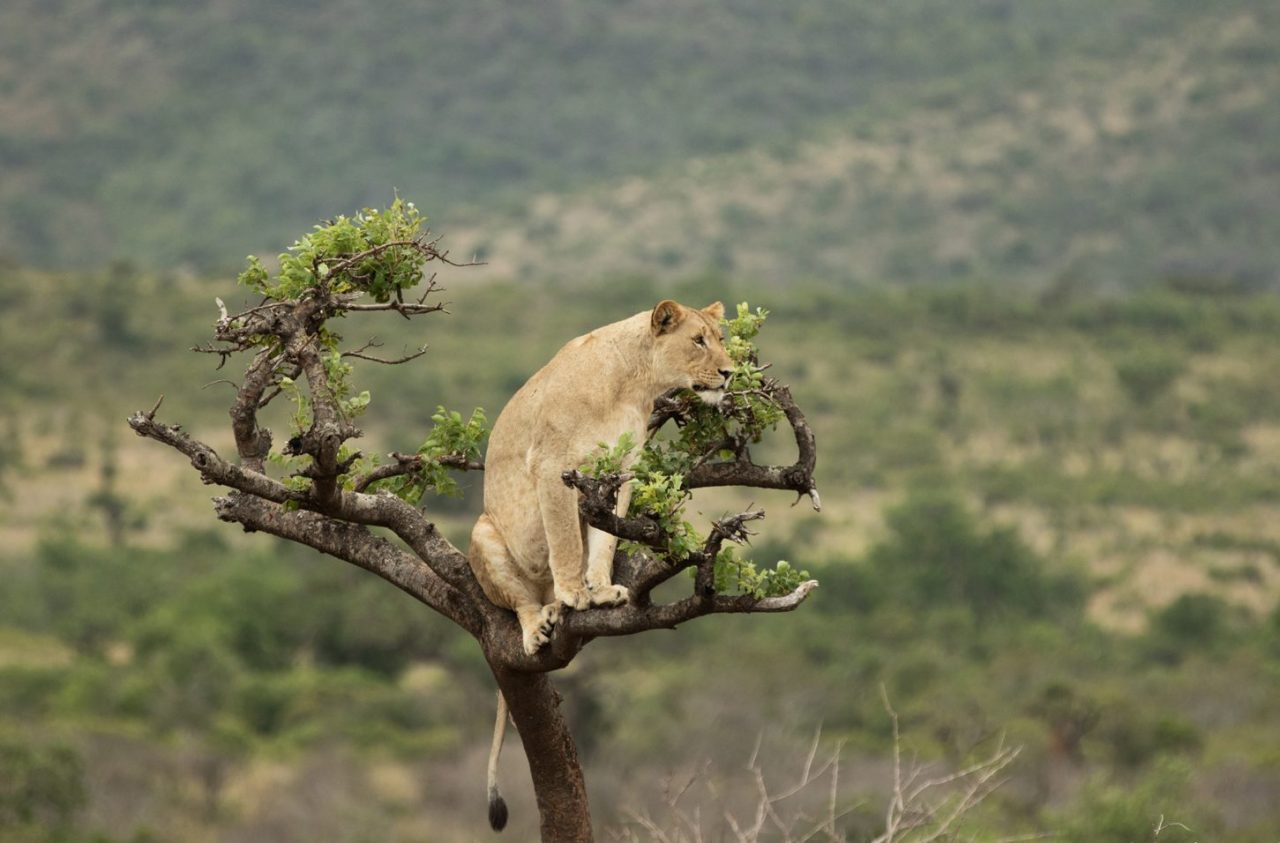
- Responsible Tourism
As guardians of many iconic species, Rwanda is committed to safeguarding their existence within the four National Parks.
We are constantly working to ensure we can live in sustainable harmony with our environment, with a clean and green mindset. We banned plastic bags in 2008, and our lands are possibly the cleanest in Africa thanks to efforts throughout every community.
Ten percent of the income derived from gorilla, safari and other tourist permits, as well as park fees, is spent in partnership with local communities to change lives for the better.
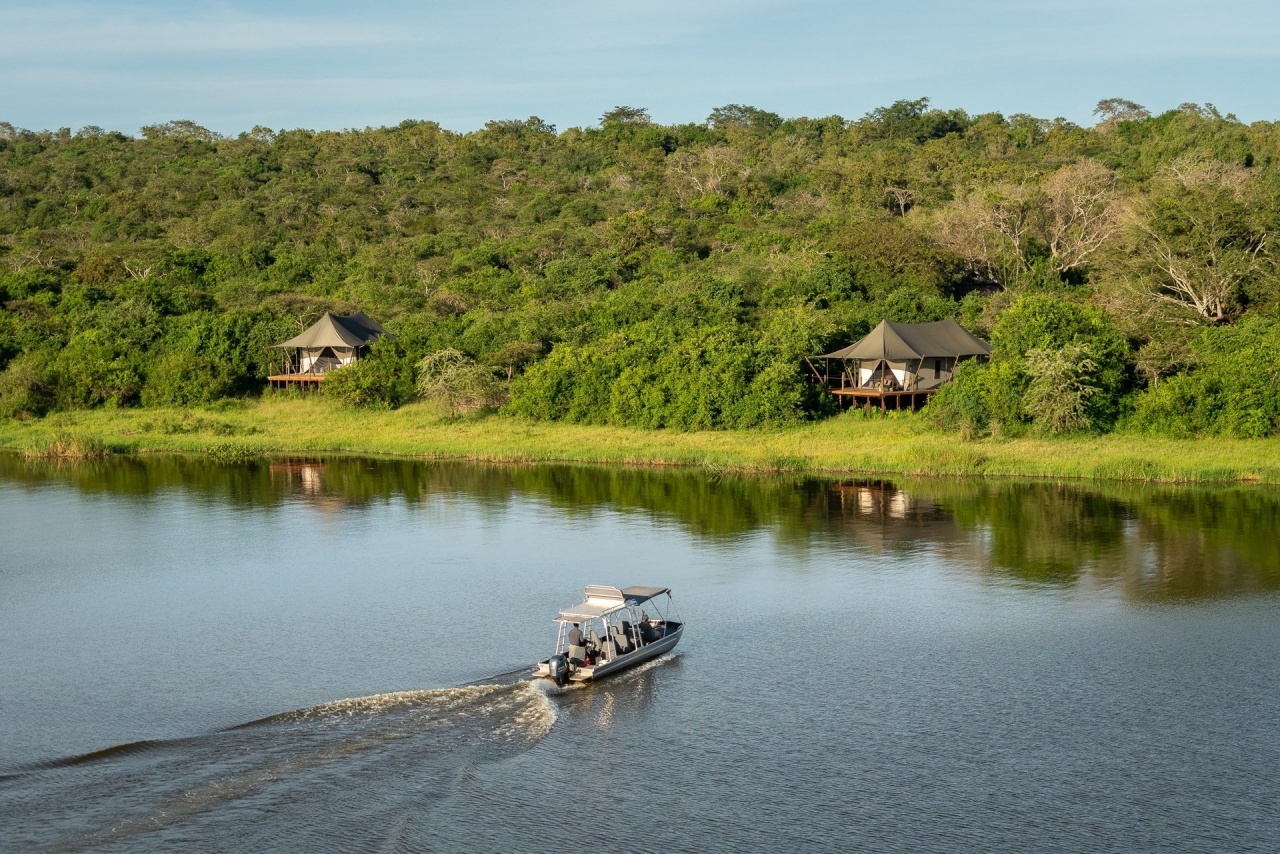
Epic Scenery
Rwanda’s dramatic vistas are endless, with a fresh perspective around every corner.
Our country is full of beauty and managing to explore it all is easy, thanks to an excellent road network linking the core areas.
Visitors can rest assured the country is safe as well as stunning – Rwanda was rankedthe9th safest country in the world by the World Economic Forum.
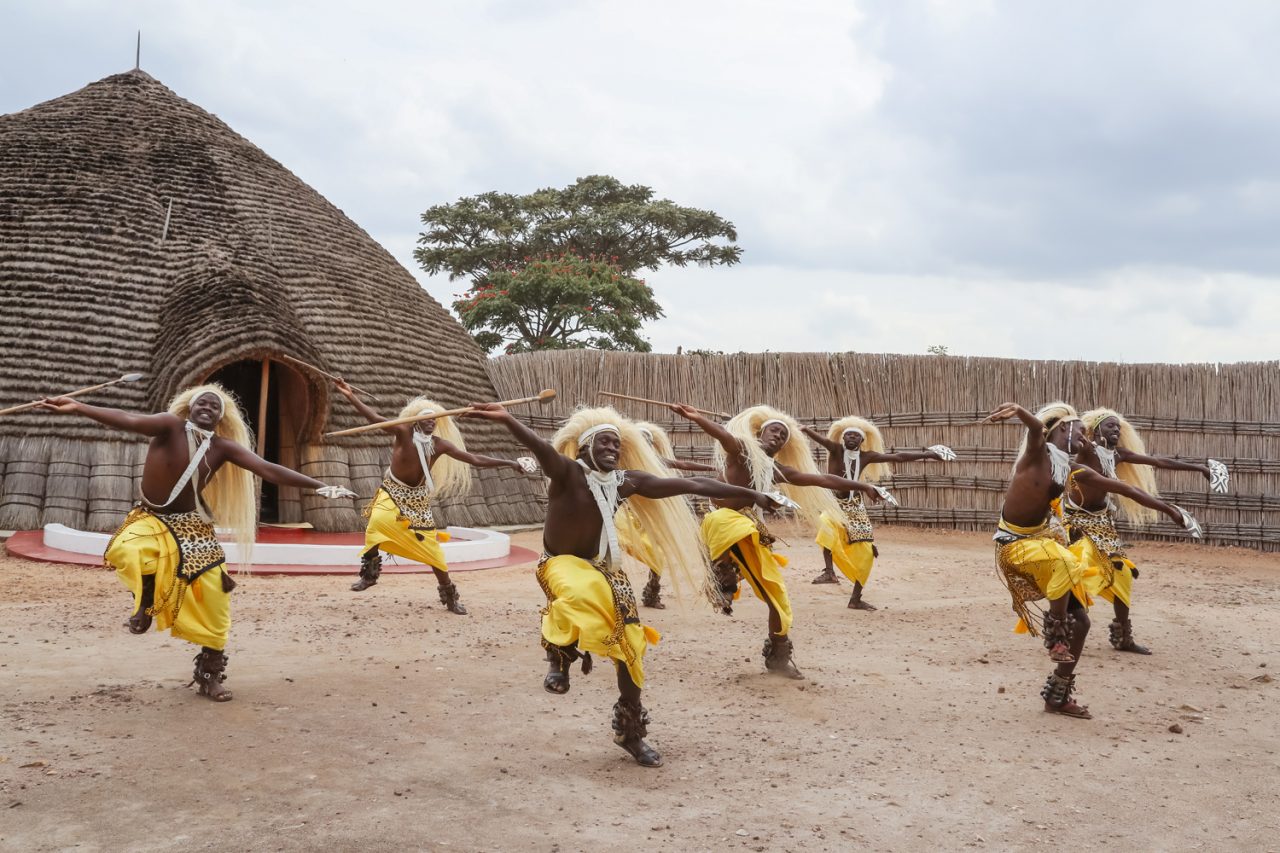
Vibrant Culture
Warm and friendly, Rwandans are also respectful, thoughtful and committed to the idea of progress, starting at the grass roots and running all the way to the top.
From the ancient kingdom to the modern day, creativity is something to be celebrated, whether through traditional dance, unique architecture or works of art.
Gorilla Tracking
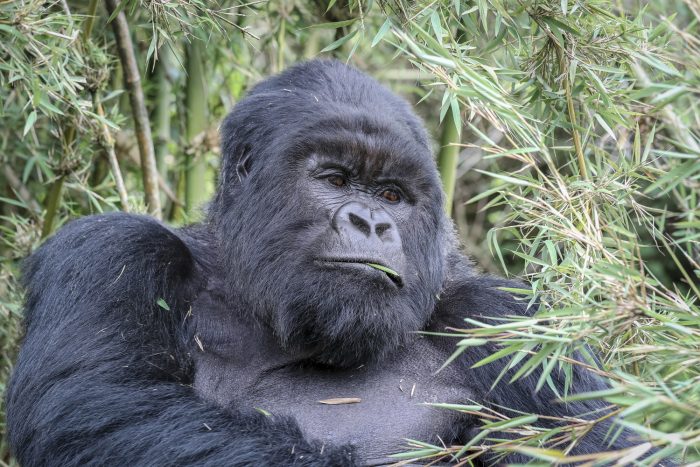
Photo Credit : Annabel Illingworth
Culture & heritage, king's palace.
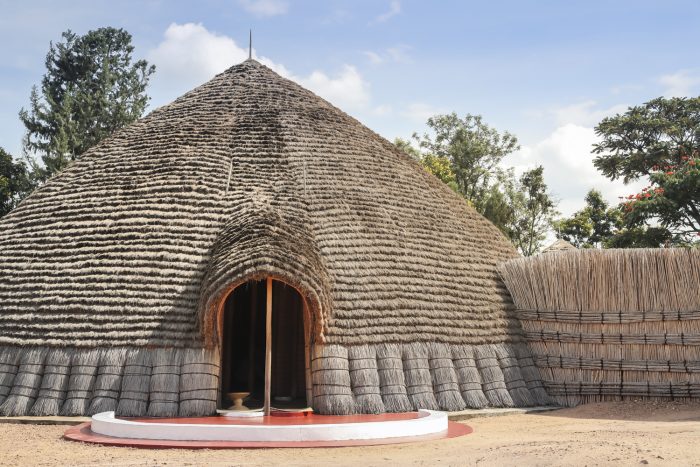
- Accommodation
Where to Stay
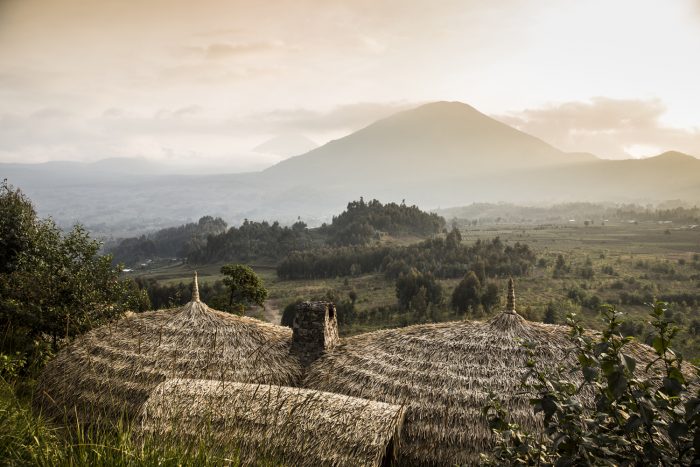
Sport & Adventure
Canopy walkway.
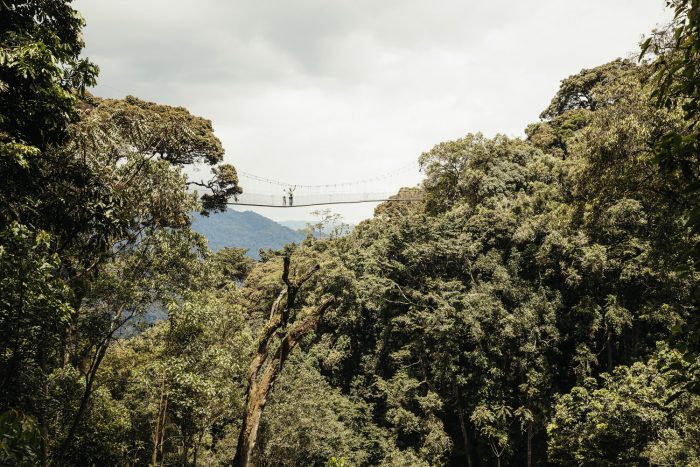
Rwanda is ranked as the second easiest place to do business in Africa by the World Bank and has been awarded for its leadership in tourism and economic competitiveness by the World Travel and Tourism Council (WTTC) and the World Economic Forum respectively.

Paving the Way
The German carmaker has just opened an assembly plant in Rwanda, which will create up to 1,000 jobs.
In a new chapter of economic transformation, VW is also spearheading community car sharing and ride-hailing by smartphone.
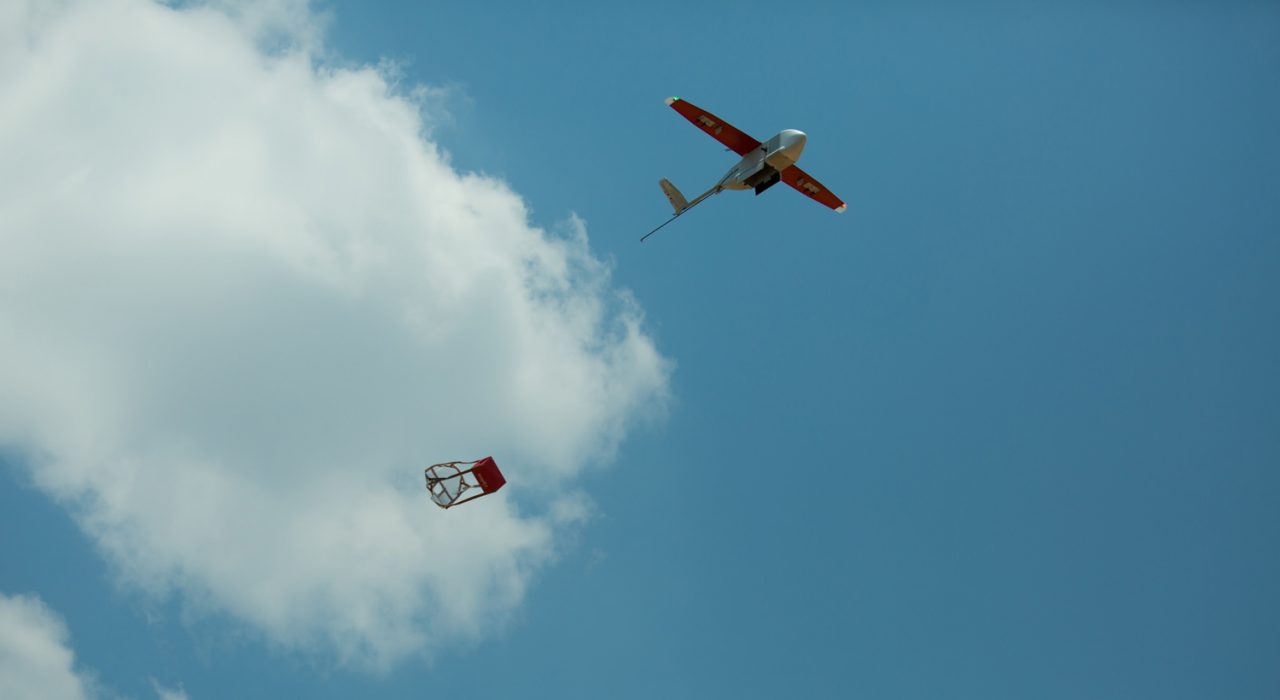
Tech Incubator
Rwanda is an ideal tech incubator, thanks to its compact size and appetite for innovation.
We welcome pioneering initiatives such as that by Silicon Valley company Zipline, which now delivers critical blood products to rural medical clinics across our mountainous lands.
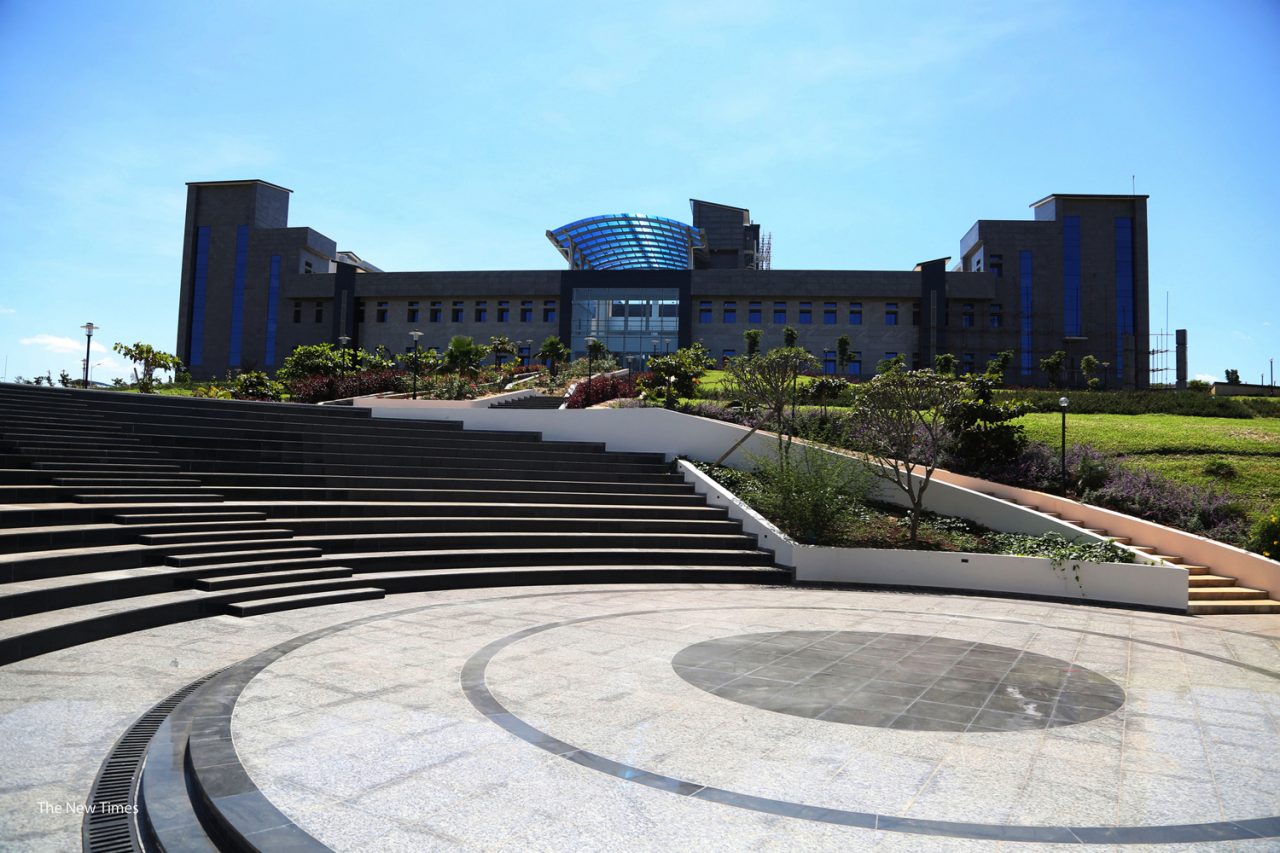
Centre of Excellence
Innovation city.
Discover an area in Kigali for world-class universities and think tanks to mingle with technology companies, helping drive private sector growth.
Innovation City is anecosystem linking high tech industry, research and education with capital investment, which aims to create jobs and reduce our current account deficit.
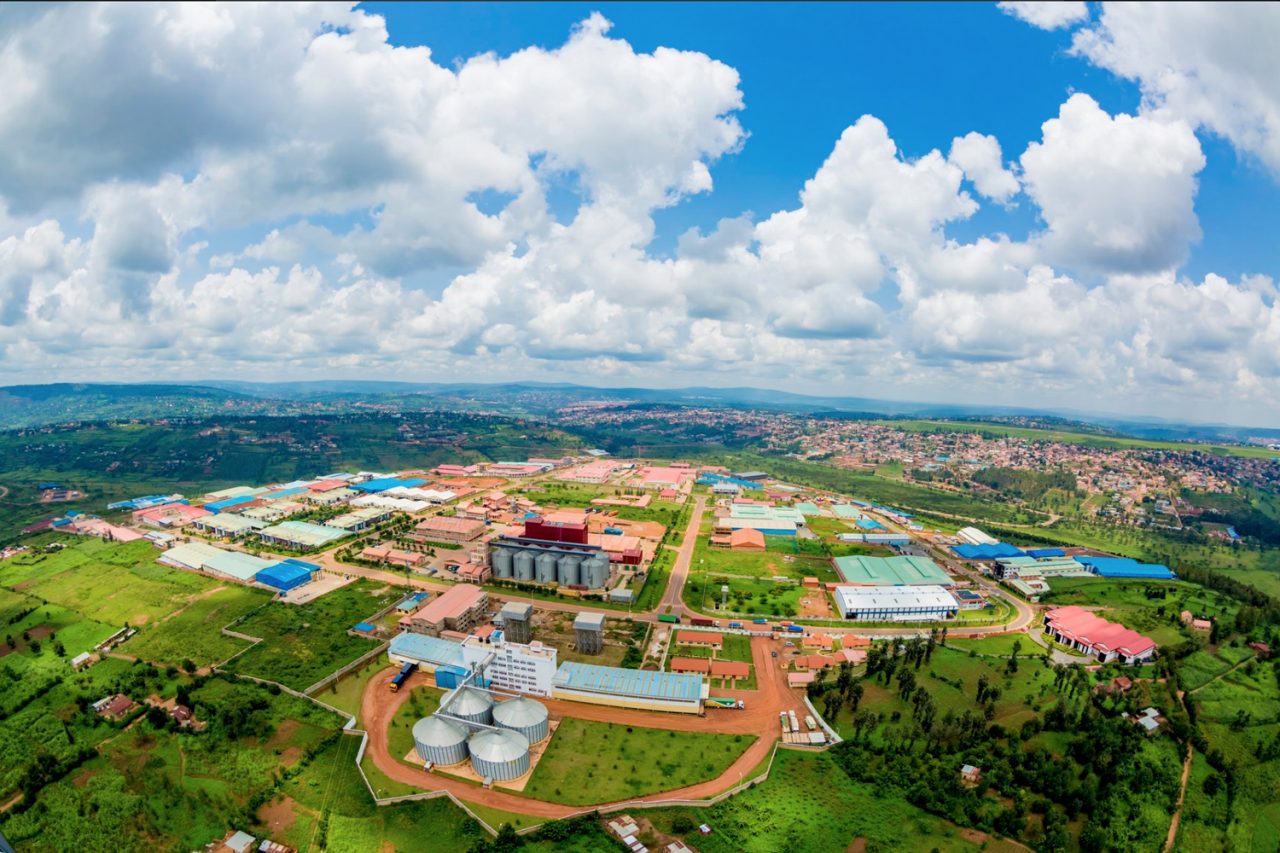
Special Economic Zones
Discover why we are the second fastest growing economy in Africa,and prepare to enjoy the opportunities accrued from the free trade agreements that weve signed with over 50 countries.
Designated serviced land is provided for small and large scale industrial development, as well as reliable, quality infrastructure, competitive fiscal and non-fiscal regulations and streamlined administration procedures.
Five Reasons

How to Invest
Starting a business.
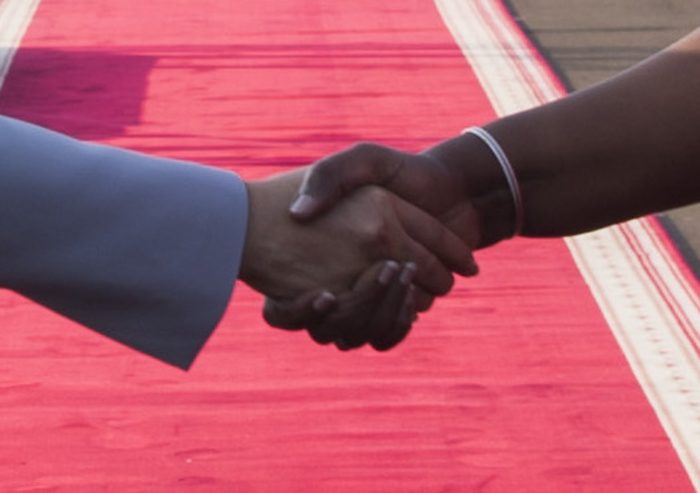
Investment Opportunities
All sectors.
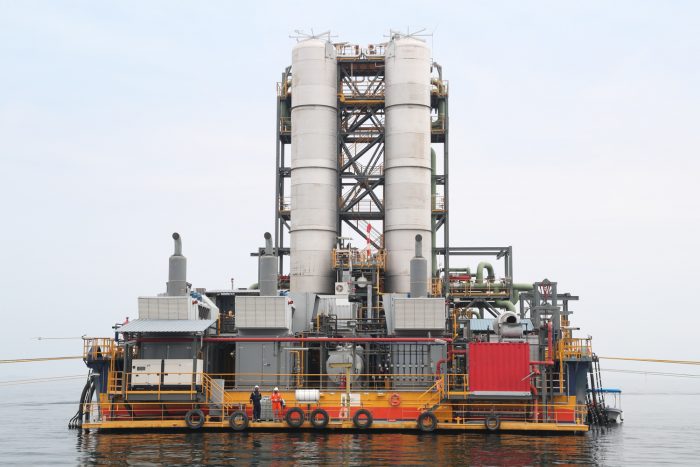
One Stop Centre

Rwanda is an excellent hub for meetings and events, with world-class facilities such as the Kigali Convention Centre which is conveniently located close to Kigali International Airport and offers a premium environment for regional and international conventions, exhibitions, festivals, meetings and other events.
Business Events
Kigali convention centre.
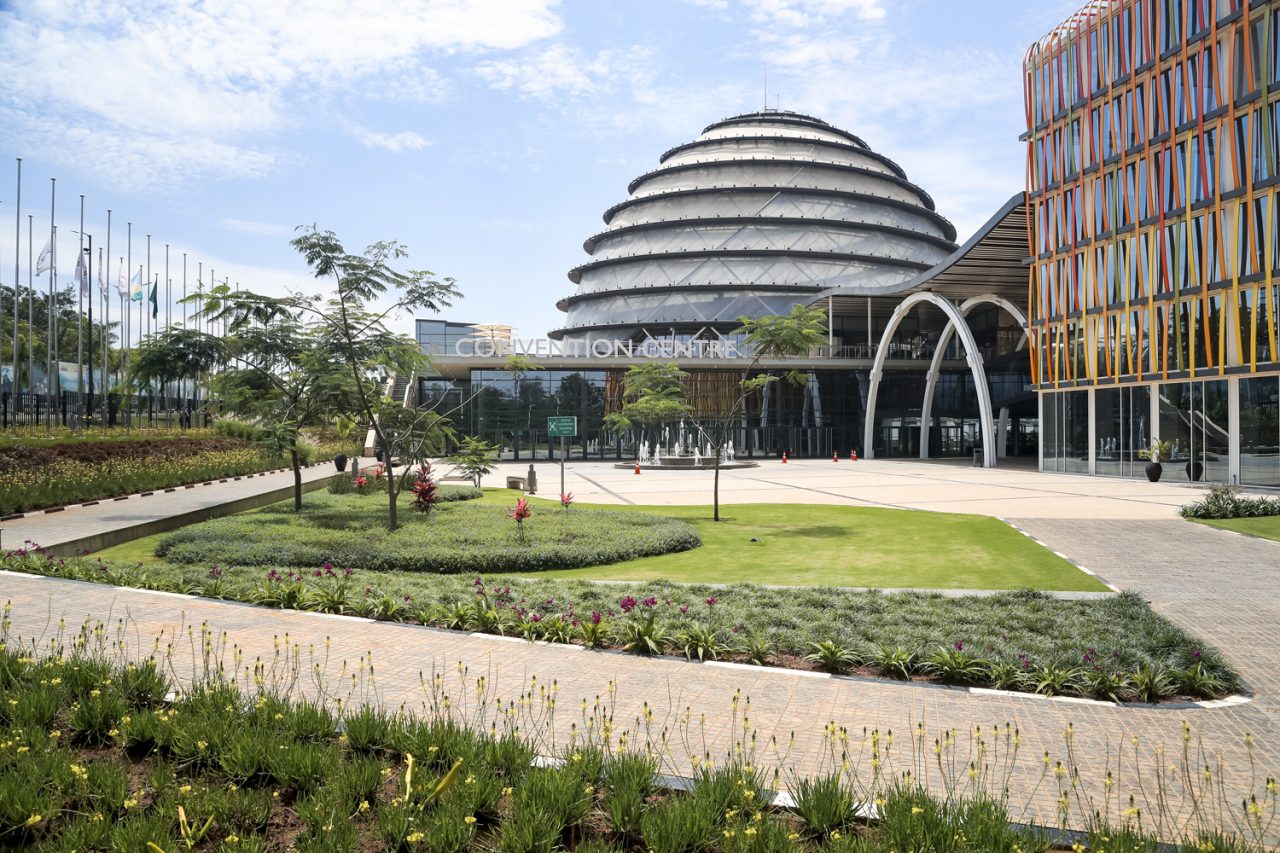
Around the Capital
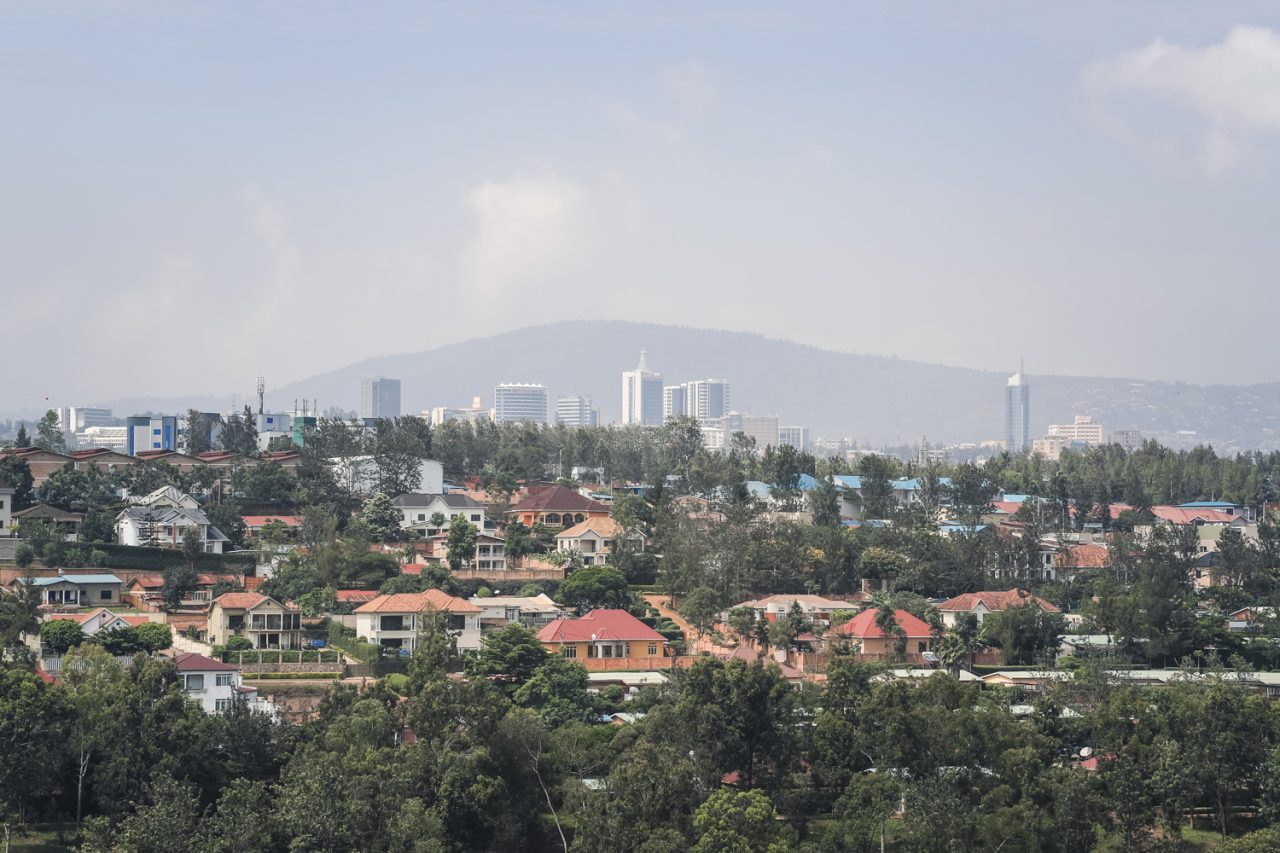
National Airline
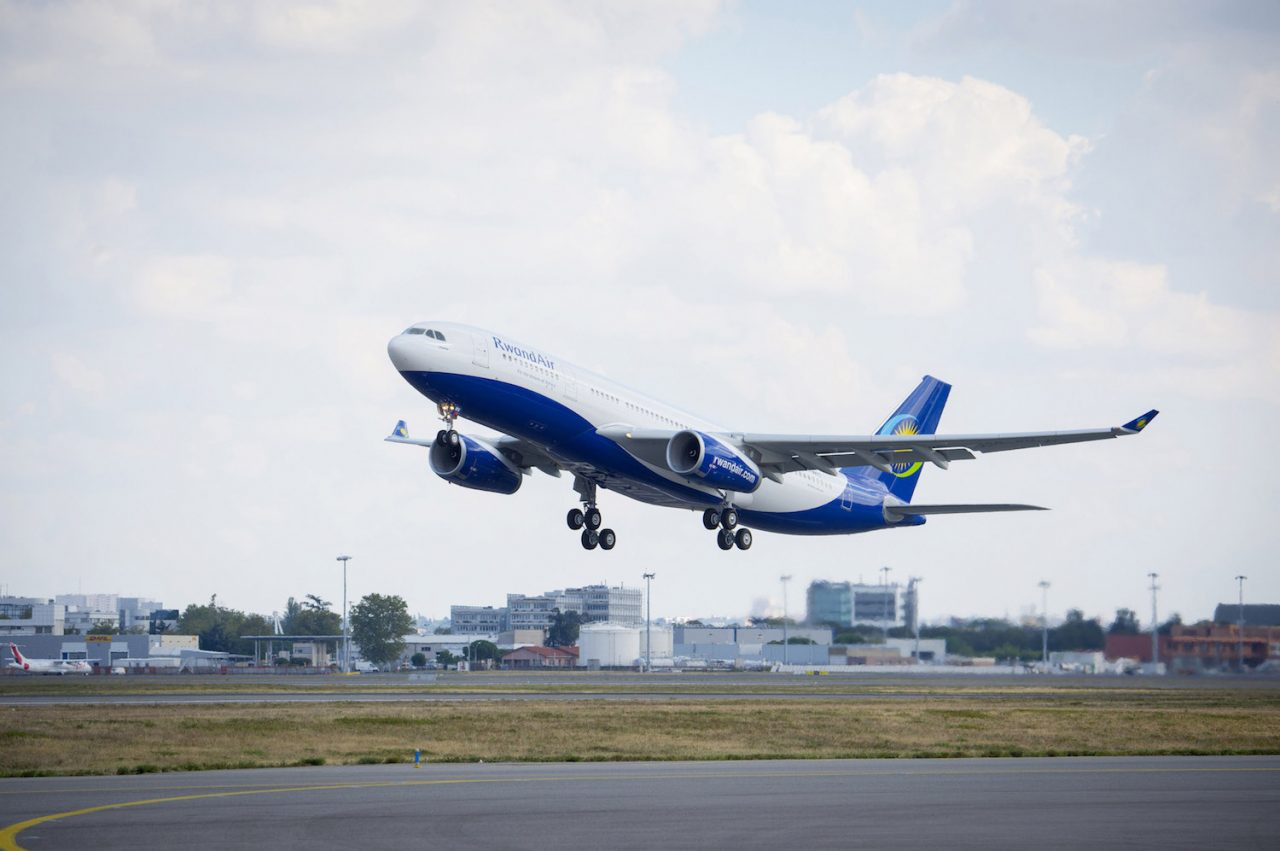
Visit Rwanda is proud to partner with some of the world’s biggest brands to share the beauty of the country with millions around the globe.
Sleeve Sponsor
Premium Partner
Paris saint germain.

Platinum Partner
Fc bayern m체nchen.

Founding and Host Partner
Basketball africa league.

Yellow Jersey Sponsor
Tour du rwanda.

- National Parks
- Culture & Heritage
- Sports & Adventure
- Itineraries

Update April 12, 2024
Information for u.s. citizens in the middle east.
- Travel Advisories |
- Contact Us |
- MyTravelGov |
Find U.S. Embassies & Consulates
Travel.state.gov, congressional liaison, special issuance agency, u.s. passports, international travel, intercountry adoption, international parental child abduction, records and authentications, popular links, travel advisories, mytravelgov, stay connected, legal resources, legal information, info for u.s. law enforcement, replace or certify documents.
Share this page:
Learn about your destination
Take 90 seconds for safer travel.
Travel Advisory Levels
Enroll in step.

Subscribe to get up-to-date safety and security information and help us reach you in an emergency abroad.
Recommended Web Browsers: Microsoft Edge or Google Chrome.
External Link
You are about to leave travel.state.gov for an external website that is not maintained by the U.S. Department of State.
Links to external websites are provided as a convenience and should not be construed as an endorsement by the U.S. Department of State of the views or products contained therein. If you wish to remain on travel.state.gov, click the "cancel" message.
You are about to visit:
- [email protected]
- +250-788-152-222
- Mon-Fri 8am - 5pm

Visitors visa
REQUIREMENTS FOR APPLICATION
* This type of visa is issued to person who is a national or a resident of a country with which Rwanda has a visa waiver arrangement including African Union, Common Wealth and La francophonie who enters the country for any valid reason other than employment.
* It is issued at entry point or embassy
* Any genuine acceptable travel document valid not less than 6 months
* Single entry
* Work is not permitted
* Change of status is allowed
APPLICATION FEES
* Free of charge
VISA VALIDITY
Valid for 90 days for nationals of a country with which has visa waiver with Rwanda and 30 days for nationals of a country which is a member of African Union, Common wealth and La francophonie.
* This type of visa is issued to a citizen of East African Community Partner States
* This type of visa is issued upon arrival at the border post
* Change of status is not allowed
* May be extended in exceptional circumstances
* Valid up to six months
* This type of visa is issued to a national of a country member of a regional organization or community with free visa other than the East African Community citizens
* This type of visa is issued at entry point or embassy
* Fees is agreed upon at community or organizational level
This type of visa is issued to a crew member of an aircraft or boat at entry point
Not allowed
WHERE APPLICATION IS MADE
Issued at point of entry or embassy
TRAVEL DOCUMENT
Any genuine travel document valid not less than 6 months
Free of charge
SINGLE OR MULTIPLE ENTRIES
Single entry
Work is not allowed
CHANGE OF STSTUS
Period of seventy two(72) hours
VISA EXTENSION
May be extended in exceptional circumstances
ELIGIBLE PERSON
* This visa is issued to a foreigner who visits Rwanda for holiday, sightseeing, social or recreational or other short-term reasons other than work purposes.
* This visa is issued upon arrival at the border post, online, at immigration and emigration office, at the office of a diplomatic mission of Rwanda in the applicant’s country of residence or at any other place as may be determined by the Directorate General. Click here to apply
TRAVEL DOCUMENT
* Any genuine acceptable travel document valid not less than 6 months.
* 50 USD for single entry and free of charge for nationals of countries with which Rwanda has a visa waiver arrangement including African Union, Common Wealth and La francophonie.
* 70 USD for multiple entries
* Single or multiple entry
* Work is not permitted
CHANGE OF STATUS
* Allowed
* Valid for a period of thirty (30) days for single entry or of ninety (90) days for multiple entries.
VISA FEES
* This visa is issued to a foreign diplomat visiting Rwanda for official purposes.
* Issued upon arrival at the border post, online, at immigration and emigration office, at the office of a diplomatic mission of Rwanda in the applicant’s country of residence or at any other place as may be determined by the Directorate General.
* Free of charge
* Not allowed
* valid for a period of thirty (30) days
* Click here to apply
* This visa is issued to a foreign diplomat accredited to Rwanda who regularly visits for official purposes
* At the Directorate General of Immigration and Emigration
* Multiple entries
* Prohibited
* It is valid for a period of two (2) years
* It is renewable up on application
* This visa is issued to a foreign skilled worker who is seeking employment and whose skills are on the occupations on demand list. For more information click here
* At the Directorate General of Immigration and Emigration, at the office of a diplomatic mission of Rwanda in the applicant’s country of residence or at any other place as may be determined by the Directorate General.
* 50 USD
* Multiple entries
* Work is not allowed
* VALID FOR 90 DAYS
* This visa is issued to a foreigner who intends to enter Rwanda for conference, meeting, workshop or any other related activity.
* This visa is issued upon arrival at the border post, online, at the Directorate General, at the office of a diplomatic mission of Rwanda in the applicant’s country of residence or at any other place as may be determined by the Directorate General
* 50 USD and free of charge for nationals of countries with which Rwanda has a visa waiver arrangement including African Union, Common Wealth and La francophonie.
* Single entry
* Work is not permitted
* Valid for thirty (30) days.
* This visa is issued to a foreign prospective investor, entrepreneur or trader who visits Rwanda to explore available business opportunities
* Issued at the office of a diplomatic mission of Rwanda in the applicant’s country of residence, at immigration and emigration office or at any other place as may be determined by the Directorate General
* 50 USD for single entry
* Single or multiple entries
* Work is not allowed
* Valid for a period of ninety (90) days
* Renewable once
* This visa is issued to a foreigner who enters Rwanda for medical treatment or medical consultation confirmed by a recognized medical practitioner. It is also issued to his or her foreign care attendant.
* It is issued upon arrival at the border post, online, at immigration and emigration office, the office of a diplomatic mission of Rwanda in the applicant’s country of residence or at any other place as may be determined by the Directorate General
* 30 USD
* Valid for a period of ninety (90) days
* Renewable
* This visa is issued to a foreigner who is travelling as a member of a group of four (4) to ten (10) tourists.
* This visa is issued at the office of a diplomatic mission of Rwanda in the applicant’s country of residence, online or at any other place as may be determined by the Directorate General. It may also be issued at entry point upon showing prior approval by the Directorate General.
* 150 USD
* Valid for a period of thirty (30) days.
* May be extended in exceptional circumstances
* This visa is issued to a foreign investor, board member or representative of a multinational company who does not reside in Rwanda but has significant business activities in the country and needs to regularly visit his or her activities.
* At the directorate general of Immigration and Emigration head quarters
* 200 USD
* Valid for a period of two (2) to ten (10) years renewable
* May be extended up on application
* This visa is issued to a foreigner who has lost his or her status of stay in Rwanda while he or she prepares to leave or to apply for a new status.
* It is issued at the Directorate General or any other place as may be determined by the Directorate General
* This visa is issued for a specified period, which cannot exceed ninety (90) days effective from the date of its delivery
* This visa is issued to a foreign tourist who intends to visit countries signatories to the agreement on the establishment of the East Africa Tourist Visa and its revenue sharing or any similar agreement.
* This visa is issued upon arrival at the border post, online, at the office of a diplomatic mission of Rwanda in the applicant’s country of residence or at any other place as may be determined by the Directorate General.
* 100 USD
* Its validity, usage and number of entries depend on the agreement between concerned parties.
* Long-term visitor visa is issued on a reciprocal basis to a foreigner who visits Rwanda for visit, conference or any reason other than work purpose
* This visa is issued at the office of a diplomatic mission of Rwanda in the applicant’s country of residence, at the Directorate General or any other place as may be determined by the Directorate General.
* 160 USD
* This visa is valid for a period that may be up to ten (10) years
* Renewable up on application
Our Address
KG 7 Ave Kigali-Rwanda Open: Mon-Fri 7am - 5pm
[email protected] [email protected] [email protected]
+250-788-152-222 +250-788-899-971 +250-788-809-607
Home > Rwanda > Rwanda Travel Tips: Dos and Don’ts to Know Before You Go
Rwanda Travel Tips: Dos and Don'ts to Know Before You Go

A Fresh Perspective on Rwanda
This post on Rwanda travel tips is one of four Unconventional Route blog posts about Rwanda. The others are Rwanda's pros and cons , hiking Mount Bisoke , and Rwanda itinerary planning guide .
This blog post of Rwanda travel tips shares what we didn't know before we came and learned along the way.
Since we only visited for eight nights, we're far from Rwanda travel experts. But sometimes fresh tips from a fellow novice can be handier than stale ones from a jaded expert, right? Sometimes ?
Here's hoping you'll find one or two (or all twenty-seven!) of these Rwanda travel tips to be useful.
And if you come up with any tips of your own, please share them in the comments .
Tips for your Trip
These Rwanda travel tips are split into five sections. Jump to directly to any by clicking these shortcut links:
Before Leaving
- Upon Arrival
While in Rwanda
Things not to do.

Before Going to Rwanda
✓ get and read the bradt guidebook.
Put it this way: If Bradt decided to transform all the info from its Rwanda guidebook into a blog, you wouldn't need to read this post or any other.
It had all the information we needed for our trip—much more than you'll find anywhere online—plus bonus sections with stories and background on specific topics that added color to what we saw.
Get a copy from a friend who's been to Rwanda and has a copy, a library, your local bookstore, or Amazon .
✓ Read up (or watch up)
I was glad to have read Road Trip Rwanda (a lighter read) and We Wish to Inform You That Tomorrow We Will be Killed With Our Families (dense and heavy) before visiting. And I had hoped to get through A Thousand Hills to better understand Paul Kagame and what happened after the genocide, but had a thousand other things to do before our trip and ran out of time.
For non-readers, a couple movies to watch are Shooting Dogs and Hotel Rwanda .
Or get an audiobook: You can listen to it as you drive around Rwanda. If you don't have an Audible account yet, sign up to get your first book free .

✓ Understand the confusing city name situation
When it comes to the names of Rwanda's cities, you have to be kind of bilingual. (Bi-nom-ual?)
That's because in 2006 the Rwandan government got rid of its old provincial lines, redrew four new ones (North, South, East, and West), and renamed many of its cities.
Some of those city names, like Musanze over Ruhengeri close to Volcanoes National Park, have been embraced. Most others have not. For example, you're more likely to see and hear Kibuye (old) over Karongi (new) or Gisenyi (old) over Rubavu (new). For Butare (old) / Huye (new), we heard an equal mix of both.
✓ Note the exchange rate
Our hotel tried to pull a fast one on us and charge us 20 USD for a shuttle from the airport that they'd quoted us 15,000 RWF on. They said it's "approximately" the equivalent. Yeah right. At the time, 1 USD was worth 950 RWF so 15,000 RWF actually equals 15.75 USD. They overcharged us by approximately 27%.
✓ Check the travel advisories
Rwanda's as safe as everyone says but it's got a couple of unruly neighbors. And some say Rwanda's hiding some stuff in its basement that could get nasty if it got out, too.
Play it safe and double-check the status before heading there. As we shared in our top travel tips and tricks , we find the UK's advisories to be the most reliable.

✓ If you decide to rent a car
As far as we could tell, the only international rental car company in Rwanda is Europcar. It's overpriced and overburdened with policies like mileage limits and damage deposits.
Rent from a Rwandan company instead.
Here's how:
- Google "Rwanda car rental" to get the email addresses of a few companies.
- Email them for quotes. Better yet, ask them if they'll rent to you a self-drive Rav4 or equivalent for 30 USD a day. This includes additional drivers, unlimited mileage, and insurance.
- Pick whichever company offers the best rate and get their WhatsApp contact to coordinate.
- When you arrive, they'll bring the car to you. Give it a quick test drive and pay. Cash only .
- Fill it up at the nearest gas station because they'll deliver it with fumes in the tank.
- Explore Rwanda.
- Return the car in one piece and with an empty tank. Since it's a cash transaction, there's no inspection or charges for scratches or dings.
Shoutouts to Jeannine from Car Self Drive Rwanda, [email protected]. We had a zero-fuss experience renting from her.
Worried about driving in Rwanda? Don't be. Rwanda's roads are good, drivers are courteous, and traffic is moderate. Only worry about the low speed limits. Kim got a ticket within the first hour of driving.
✓ Pack these items
- A few hundred USD. For paying for your rental car and for emergencies.
- Water bottle. You can't drink the tap water and Rwanda's anti-plastic, so fill up your water bottle at your hotels every morning. If you're on the market for a new water bottle, get the CamelBak chute , one the rare things I'd I'd immediately buy again if I lost it .
- Clothing that covers your knees for women . Not only is this respectful, but the chances you'll be bitten by malarial mosquitos also will far lower.
- Duty-free wine. Especially if, like us, you're coming from South Africa. Wine's way overpriced in Rwanda. Even if you don't drink it makes for a good gift for your hosts.
- More warm clothes than you think. While Rwanda's just south of the equator, much of it's a mile or more above sea level and it's often misty or rainy.
- The regular stuff. See my always-evolving 57-item packing list and Kim's 15 travel essentials for more ideas on what to pack.
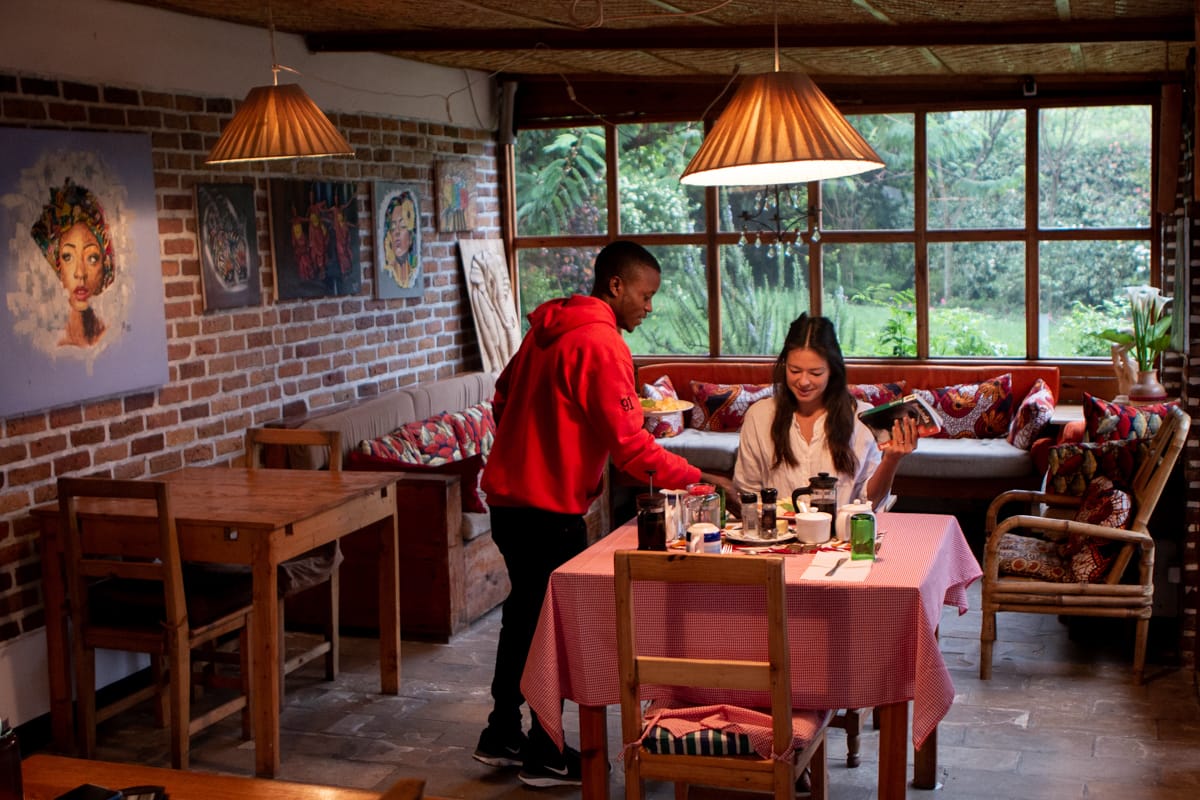
✓ Stay somewhere with good showers and laundry for Volcanoes National Park
After a messy adventure up and down Mount Bisoke in Volcanoes National Park were grateful our guesthouse, La Locanda , had strong warm showers, staff that offered to wash our clothes before we took off the next day, a fireplace to warm up at and dry our shoes by, and a tasty on-site restaurant.
You'll likely be grateful for the same whether you go gorilla or golden monkey trekking, hike to the Dian Fossey memorial, or up and down the volcano.
✓ Don't let Rwanda's small size fool you
With its "thousand hills," Rwanda's like a bunched up sheet of tin foil; if you were to flatten it out, it'd cover a much larger area. And the indirect roads that swerve through the hills combined with painfully slow 40km/hr speed limits make it seem bigger.
✓ Use our honest itinerary tips to decide what to squeeze in
Our Rwanda itinerary tips blog post shares our opinions on the pros and cons of the country's main areas, plus advice on what to do and where to stay in each.

Upon Arrival in Rwanda
✓ dump your plastic bags (or hide them).
Any skeptics who claim plastic bag bans are worse for the environment should visit Rwanda, which has been bag-free since 2006. The country's lack of trash and cleanliness may just change their mind .
Rwanda takes its bag ban seriously. Agents at the airport's baggage carousels are on the lookout to confiscate whatever they can. They even took the duty-free bag our wine was in.
But they don't have plastic bag smelling dogs yet. I managed to smuggle one inside my jacket pocket, which I wanted to use for what I expected to be extremely dirty clothing after our Mount Bisoke hike in Volcanoes National Park.
✓ Get a SIM card
MTN has a booth beside the parking lot outside the arrivals terminal of the airport. If you prefer to be a bit contrarian, there's an Airtel around the corner. A SIM card costs 1,500 RWF and 1 GB of 4G data costs 1,000 RWF.
Cell reception is reliably strong just about everywhere in the country.
✓ Withdraw cash
Get cash from the ATMs outside the airport because smaller businesses in Rwanda, and even some gas stations, don't take credit cards. Or their machines "are out of batteries."
You might have to make two withdrawals because the limit is 200,000 RWF (~200 USD).

✓ Adjust your internal clock
You're going to have to wake up early for trekking in Volcanoes and Nyungwe and safaris in Akagera, so you might as well get used to it. Try to go to bed early to wake up by 6 a.m. In doing so, you'll be rewarded with more bird sightings, beautiful sunrises, longer days, and more sun (as the rain tends to arrive in the afternoon).
✓ Choose wisely between RWF and USD to save some money
Whenever you have the option of paying in Rwandan francs or US dollars, ask for the price in both currencies and pay whichever is cheaper.
For example, the park fees for our two nights in Akagera were 212 USD (50 per person per night, plus 12 for the car) or 194,000 RWF. At the true exchange rate our travel credit card uses, 194,000 RWF was only 202 USD at the time, so paying in RWF instead of USD saved us 10 bucks.
✓ Tip appropriately
The tipping situation in Rwanda is less cut-and-dry than anywhere we've traveled. There is no default rule of X% or $Y for doing Z. So we're not 100% sure about this travel tip, but you can't sue us so we'll share it anyway.
We decided to go "old school." If the service was really good, we were tipped generously. If was terrible, nothing. And, since people in Rwanda could use our money better than us, we erred on the side of generosity—But not so generously that they'd start expecting big bucks from every tourist they serve.
✓ Use Yego to know how much to pay for motorcycle taxis
To avoid paying muzungu prices for motorcycle taxis, use the Yego app to get the true price, show it to the driver if they try to overcharge you, and don't pay any more than what it says.

✓ If you're going on an Akagera safari
- Fill up before getting into the park. There are no gas stations inside.
- Drive out the north exit. It's an all-day drive from the south entrance to the north exit, but we found more animals in the open savannah up north than in the dense bush down south.
- Hire a guide. Our guide Samuel didn't have the best English and wasn't eagle-eyed (he actually had a lazy eye), but he knew a heck of a lot more than us about wildlife and could tell us where to go in the gigantic park. Hiring Samuel also gave us the chance to chat with a Rwandan for a full day. His story of surviving the genocide as a 2-year-old (his mom hid him under his shirt when she was murdered), then struggling to make it as an orphan was more memorable than any animal sighting. And the 40 USD does him and the park a lot more good than whatever we'd fritter it away on otherwise.
- Stay a night or two. Ruzizi Tented Lodge and Karenge Bush Camp let us bloggers stay for free, and they're not cheap otherwise, so our opinion may be biased, but we honestly think the experience of staying a night or two in Akagera is worth it. It gives you the chance to see more animals when they're most active in the twilight hours, the camps have beautiful settings, the staff and food's outstanding, and the sunrises, sunsets, and stars are stunning.

✓ Ask how long the food will take before ordering at restaurants
Some dishes can take well over an hour to prepare at Rwandan restaurants. If you rather not wait, ask which ones are relatively speedier. Or pre-order your meals earlier in the day at your hotel's restaurant.
✓ If you like spicy food, try the Akabanga
Akabanga is a super spicy sauce that comes in an eyedropper bottle. It's as omnipresent as salt atop Rwanda's restaurant tables and has made a one-time street vendor named Sina Gerard one of Rwanda's richest men .
Stop by Akabanga's birthplace, Nyirangarama, to get your own bottles (500 RWF) on your way between Kigali and Volcanoes National Park.
They sell Rwandan wine (7,000 RWF) and canned banana beer (1,000 RWF) there, too. We advise against wasting money on the wine and recommend getting just one can of banana beer. It may satisfy your curiosity but almost certainly won't satisfy your taste buds.
✓ Ask for avocado
Avocados abounded when we visited Rwanda in January/February. Even at a mzungu premium, we got them for 100 RWF each.
Unfortunately for us avocado fans, most of the restaurants we went to didn't offer avocado on their menus. They didn't seem to understand how much we enjoy them. But if we asked they were often able to add them to our orders.

✗ Don't drive at night
We did it once—after losing track of time post- Mount Bisoke hike —and never again.
Oncoming cars and trucks veered into our lane as if our car didn't exist and the cyclists and pedestrians on the roadside didn't seem to realize they're barely visible at night. It was terrifying.
✗ Don't speed
We learned this the hard way. We got a 25,000 RWF fine within our first hour on the road.
The speed limits change from 80 km/h to 40 to 60 with no rhyme or reason, so keep an eye on the signs. And even when it seems unreasonable to go 40 km/h, abide by the limit or pay the consequences. Speed traps are everywhere. So are children, cyclists, and other pedestrians on the street.
✗ Don't arrive in Rwanda on umuganda
Umuganda happens on the morning of the last Saturday of every month. All Rwandan citizens aged 18 to 65 are required to participate in community service and everything else closes and grinds to a halt.
It's nice to see and great for driving around because the streets are empty, but, take it from us, it's a hassle if you've just arrived in Rwanda and are trying to sort things out.
✗ Don't dig up nightmarish memories
It's hard not to be curious about what people's experiences were during the genocide, but many understandably prefer not to talk about it. Wait for them to bring it up and go to the genocide memorials around the country to learn from the displays and staff there.
✗ Don't be concerned about being the only mzungu
If you don't look Rwandan, you'll be the center of attention any time you show your face in just about any town outside of Kigali. Adults will stare. Children will sing "Ah… ah… abuzungu" ("White people!) and rush towards you. And some brave people will mosey on up to your car to peek inside.
Be a good ambassador for all of us foreigners. Wave, smile, ignore any requests for money, and say, "Muraho" ("Hello" in Kinyarwanda. Pronounced like mor-ah-ho with a Spanish-style r flip).

✓ Head to the airport 15 minutes earlier than normal
Kigali's airport has heavy security. To enter the grounds, you need to empty your vehicle, put it on a conveyor belt scanner, and go through a detector yourself.
If you happen to be flying out at a busy time, there might be a lineup. Plan accordingly, just in case.
✓ Buy some coffee and crafts
Having lived in Colombia , done professional cuppings in Kenya , and blind taste tests of coffee in Vancouver , Cape Town , and Costa Rica, we've tried a lot of coffee. And the brews we had in Rwanda are right up there with the very best. Question Coffee, whose café is in Kigali, was Kim's favorite. Pick some freshly-roasted beans up before you return home.
Help us improve these Rwanda travel tips and help other readers by leaving a comment . Ask questions we didn't answer, challenge our tips, or share your own. Don't be shy. We want to hear from you.
Have a great trip! (And don't forget to check out our three other Rwanda blog posts—links below!)
Like this post? Pin it for later!

Read This Next:
Rwanda blog posts.

Is Rwanda Worth Visiting?

Mount Bisoke Hike in Rwanda's Volcanoes Park: A Practical Guide

Rwanda Itinerary Guide: Honest Advice for Planning an Awesome Trip
Unconventional Guides

50+ Travel Tips and Tricks That Will Change the Way You Travel

The Best Countries to Visit in the World for 18 Unique Trips

Our Rare Few Favorite Things We'd Immediately Buy Again
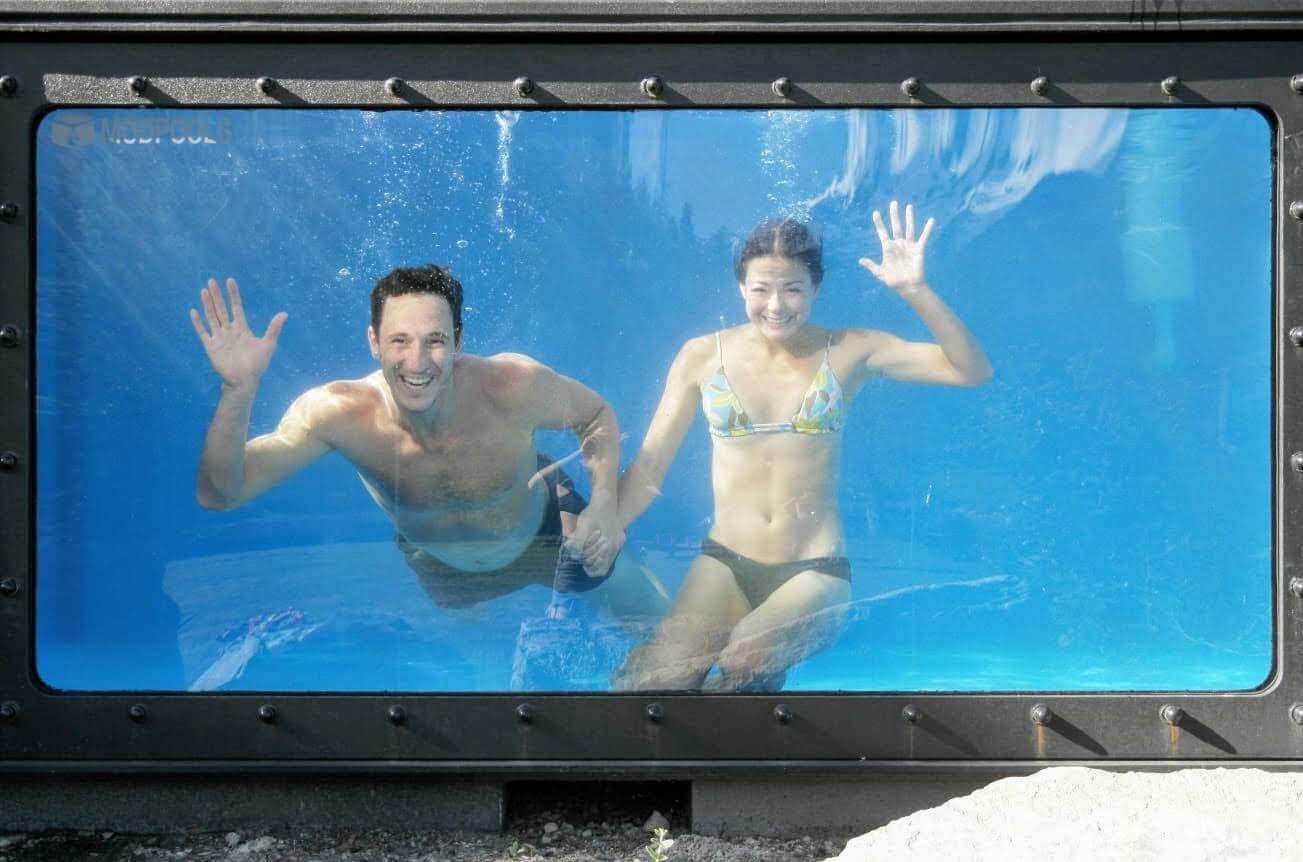
About The Unconventional Route: Our Past, Present, and Future
Disclosure: Whenever possible, we use links that earn us a cut if you pay for stuff we recommend. It costs you nothing, so we'd be crazy not to. Read our affiliate policy .
10 thoughts on “Rwanda Travel Tips: Dos and Don'ts to Know Before You Go”
Love love love this guide! I want to go to Rwanda someday in the near future, so I will definitely keep this post in mind
Glad to be of service, Suzan!
I'm glad I found your blog while searching for Mount Bisoke hikes information…. I will take a deeper look later, thanks for sharing your adventures 🙂 I will be in Rwanda in february 🙂
Glad to hear it Alexandre. Here's hoping you have a Rwanda-rful time in Feb! If you come across anything to add during your trip, please let me know.
want to see the gorillas but one of us can't survive a long ride over bad roads. How is the road from Kigali to Musanze ? And how is the road from where we should stay to where the gorilla trek starts? We can walk fine over rough ground, but bumpy roads kill her back.
The roads aren't bad. All paved until the last little bit, which is slow. The hiking can be really tough though.
Thank you for your tips. Very informative. Going to Rwanda August 2023 and only have 4 free days (working there). 2 of the free days are consecutive. Gorilla trekking too costly but thinking of doing a one day safari to Akageera. Do you recommend? Not renting a car. What are the absolute 'must sees' for such a short period of time?
Hi Edite. I wish I were the right person to ask about "must sees," but I think that's entirely subjective and the best travel experiences are unexpected stories. My suggestion since you're going to be working there? Ask people when you're in Rwanda for inside tips and contacts. Follow those leads in search of something extraordinary (…or, at least, their suggestions for "must sees"). Happy travels!
Thanks for your amazing tips and lessons learned. We'll be heading to Rwanda with our kids (7 & 10) at the end of May, and will be taking a similar route but spread over 3 weeks.
You wisely spoke of getting cash out of ATMs before hitting the road. Couldn't agree more based on our previous travels (Qatar, Oman, China, Mongolia, Russia). A lot has changed in global infrastructure since we last last travelled, so I was wondering if you were able to access cash from your Canadian bank account, or if you accessed cash from other sources (e.g. cash withdrawals from credit card).
We're from Ontario. I know we can bring cash given that we have access to good foreign exchange at home, but I'd rather not arrive with 3 weeks worth of cash for four people at the start of vacation. Back-end logistics on this would be super appreciated!
Many thanks!
Lucky kids you have! And good for you. An inspiration for Kim and I, with our 2.5 and 0.5-year olds. I have a Citibank account from my days in corporate that charges 0 exchange and ATM fees on foreign withdrawals, so can't help you with your question. May be worth looking into similar deals with Canadian banks? Or something like Transferwise's debit card?
What do you think? (Leave a Comment.) Cancel reply
Cookies on GOV.UK
We use some essential cookies to make this website work.
We’d like to set additional cookies to understand how you use GOV.UK, remember your settings and improve government services.
We also use cookies set by other sites to help us deliver content from their services.
You have accepted additional cookies. You can change your cookie settings at any time.
You have rejected additional cookies. You can change your cookie settings at any time.
- Passports, travel and living abroad
- Travel abroad
- Foreign travel advice
Warnings and insurance
The Foreign, Commonwealth & Development Office ( FCDO ) provides advice about risks of travel to help British nationals make informed decisions. Find out more about FCDO travel advice .
Before you travel
No travel can be guaranteed safe. Read all the advice in this guide and any specific travel advice that applies to you:
- women travellers
- disabled travellers
- LGBT+ travellers
Follow and contact FCDO travel on Twitter , Facebook and Instagram . You can also sign up to get email notifications when this advice is updated.
Travel insurance
If you choose to travel, research your destinations and get appropriate travel insurance . Insurance should cover your itinerary, planned activities and expenses in an emergency.
Related content
Is this page useful.
- Yes this page is useful
- No this page is not useful
Help us improve GOV.UK
Don’t include personal or financial information like your National Insurance number or credit card details.
To help us improve GOV.UK, we’d like to know more about your visit today. We’ll send you a link to a feedback form. It will take only 2 minutes to fill in. Don’t worry we won’t send you spam or share your email address with anyone.
- Sports, Entertainment
- Disasters, Refugees
- Environment
- Minijust Services
- Rwandans Abroad
- Agriculture & Animal Resources
- Business & Investment
Emergency travel document (ETD)
- EMERGENCY TRAVEL DOCUMENT (ETD)
REQUIREMENTS TO OBTAIN AN ETD
- Duly filled application form in CAPITAL print (only issued at Embassy);
- Completion of Declaration form regarding the loss of a passport or other travel document;
- Photocopy of Rwandan passport or Rwandan ID
- Two (2) colour passport-size photographs with white background and both ears in view;
- Copy of Birth Certificate;
- Copy of police report in case of lost passport (only reported as stolen or lost);
- Copy of flight ticket;
- Copy of Rwandan Passport.
NB: The Emergency Travel Document (ETD) is only valid for five (05) days from the date of issue including weekends and public holidays. Hence, all applicants are STRONGLY advised to apply for an Emergency Travel Certificate at least two (2) days prior to travel date. The Emergency Travel Document must be surrendered upon arrival to the Immigration Officer at the point of entry in Rwanda.
REQUIREMENTS FOR A MINOR BORN IN THE REPUBLIC OF POLAND
- Copy of both parents Rwandan Passports or Rwandan ID;
- Copy of the birth certificate;
- Copy of Marriage Certificate;
- Two (2) colour passport-size photographs with white background and both ears in view
NB: The application for ETD of a minor is made IN PERSON by biological parents.
CONSENT BY EITHER BOTH PARENTS OR GUARDIAN IN RESPECT OF MINORS
Consent: Minors must produce the written consent of either their both parents or their guardians, as the case may be, before they may be granted an ETC. The required consent, with certain exceptions, by the parents or guardians must be submitted to the Embassy as an ORIGINAL copy.
NB: All cases will be treated on an individual basis. Exceptions will be made after interviews conducted only at the Embassy.
The President
Institutions
Publications
Public Holidays
Cabinet Resolutions
Press Release
Laws and Regulations
Documents Archives
Muse report
Newsletters
Privacy Policy
© 2024 Republic of Rwanda
We are using cookies.
We use necessary cookies to make our site work. We'd also like to set analytics cookies that help us make improvements by measuring how you use the site. These will be set only if you accept. For more detailed information for cookies and Personal Data Protection see our Privacy policy
Individual Cookie Settings
Privacy settings
Here is an overview of all cookies use
Required Cookies
These cookies are needed to let the basic page functionallity work correctly.
Show Cookie Informationen
Hide Cookie Information
fe_typo_user
Cookies for Statistics
Statistic cookies anonymize your data and use it. These information will help us to learn, how the users are using our website.
Google analytics
Google analytics provides the statistics of usage visitors
Back Reject
Privacy policy
- Share full article
Advertisement
Supported by
A Timeline of Britain’s Troubled Plan to Send Asylum Seekers to Rwanda
The U.K. government hoped to pass a bill this week, two years after the plan was first unveiled, in an effort to override a ruling by Britain’s highest court.

By Megan Specia
Reporting from London
Britain’s Conservative government hoped to pass the Safety of Rwanda Bill on Wednesday, after a prolonged back and forth through the two houses of Parliament in which the legislation has come under sustained criticism. But the showdown over the bill continued.
The bill is intended to clear the way for the government to put some asylum seekers on one-way flights to Rwanda, in Central Africa, without first hearing their cases. Human rights experts have denounced that approach, which they say breaches Britain’s obligations under domestic and international law.
Crucially, under the government’s plans, even asylum seekers who were granted refugee status would be resettled in Rwanda, not Britain. The plan was deemed unlawful by Britain’s highest court late last year, with judges ruling that Rwanda was not a safe country in which refugees could resettle or have their asylum cases heard. The purpose of the government’s new bill is to overrule the Supreme Court, in a complicated piece of legislative wrangling that has raised concerns about the rule of law and the separation of powers in Britain.
Three successive Conservative prime ministers have pursued the plan, arguing that it would deter people from attempting the dangerous crossing of the English Channel in small boats. Prime Minister Rishi Sunak has repeatedly vowed to “stop the boats” before the British election this fall, and he has heralded the Rwanda bill as a crucial step toward that goal.
Britain has already paid Rwanda hundreds of millions of British pounds in development support and in fees to enact the plan. But not a single asylum seeker has been sent there yet, and legal challenges could thwart future deportation attempts. Here’s what has happened so far.
Boris Johnson lays the groundwork for a new approach to asylum seekers.
The British government, led at the time by the former prime minister Boris Johnson, pledged “comprehensive reform” of the country’s asylum system , floating several measures, including the removal of asylum seekers who arrive in Britain by boat or other “illegal” routes to third countries for processing. Mr. Johnson, a leading campaigner for Brexit, had promised to “take back control” of Britain’s borders by leaving the European Union.
In May 2021, the United Nations Refugee Agency denounced the plan, saying it would contravene Britain’s obligations under international law.
A new law is introduced to allow “offshore processing” of asylum claims.
Priti Patel, who was then Britain’s home secretary — an office that oversees immigration and Britain’s asylum system — introduced the Nationality and Borders Bill in Parliament. The bill made it a criminal offense to enter the country by irregular means, for instance by boat and without a visa. The bill also gave the authorities more scope to make arrests and laid out plans to remove asylum seekers to a safe country while their claims were processed . No agreements with a host country had been confirmed at the time, but the bill became law in April 2022.
April 14, 2022
Boris Johnson announces agreement with Rwanda.
In a speech, Mr. Johnson announced a five-year deal with Rwanda under which Britain would send some asylum seekers there for processing and resettlement, at a cost of 120 million British pounds, or about $150 million today.
Human rights groups immediately denounced the plan. They said it violated Britain’s commitment to the 1951 U.N. convention on refugees, which says asylum seekers must be protected in the country in which they arrive and cannot be forcibly sent to unsafe places.
June 14, 2022
The first scheduled flight to Rwanda is grounded.
A last-minute legal intervention blocked the first flight scheduled to take a few asylum seekers to Rwanda.
About 130 people had initially been expected on the flight , but their numbers had winnowed because of a flurry of legal challenges. By the day of the flight, fewer than 10 people were supposed to be on board . Then, an 11th-hour injunction by the European Court of Human Rights, a court based on a European convention that Britain is a signatory to, halted the departure.
March 7, 2023
Suella Braverman introduces the Illegal Migration Bill.
As the number of small boat crossings of the English Channel continued to rise, a new immigration bill was introduced by Suella Braverman, who was appointed home secretary during the short-lived premiership of Liz Truss and then reappointed by Ms. Truss’s successor, Mr. Sunak. Ms. Braverman said it was her “dream” to see flights carry asylum seekers to Rwanda.
The bill, which became law in July 2023, gave the Home Office a duty to remove nearly all asylum seekers who arrived in Britain through means the government deemed illegal. Under the law, asylum seekers would be returned to their home country, “or another safe third country, such as Rwanda,” and would have no right to re-entry, settlement or citizenship, no matter the outcome of their claim.
Nov. 15, 2023
Britain’s Supreme Court rules the Rwanda policy is unlawful.
Throughout all of this, the plan to send asylum seekers to Rwanda was being challenged in Britain’s domestic courts, with a case eventually making its way to the Supreme Court. In November, five judges found that the plan would breach both British and international law .
The judges found substantial grounds to believe that Rwanda could not be considered safe for refugees because asylum seekers who had their claims heard there could face “refoulement” — meaning that genuine refugees could be returned to their countries of origin and experience potential violence or ill-treatment there.
Dec. 5, 2023
Britain signs a new treaty with Rwanda.
The government signed a treaty with the Rwandan government that attempted to address the Supreme Court’s concerns. It promised various safeguards for asylum seekers, including an assurance that they would not be expelled from Rwanda if their claims were rejected.
Dec. 6, 2023
The government introduces the Safety of Rwanda bill.
The government introduced emergency legislation to override the Supreme Court’s ruling, by simply declaring that Rwanda is a safe country as a matter of law. The bill would force British courts, immigration officials and the secretary of state to treat Rwanda as safe for refugees, regardless of any evidence to the contrary.
March 1, 2024
Audit office reveals skyrocketing costs.
The National Audit Office, Britain’s independent public spending watchdog, found that the government will have paid Rwanda £370 million by the end of 2024, even though no asylum seekers have been sent there yet.
Costs will rise even further if flights get off the ground: Britain has promised to pay Rwanda £20,000 for each person sent, plus another £150,874 per person for processing and operational costs, and £120 million after the first 300 people.
The Safety of Rwanda bill bounced between the two houses of Parliament.
After a prolonged standoff between the unelected House of Lords and the elected House of Commons, the Safety of Rwanda Bill was expected to pass on Wednesday, with the government expected to use its considerable majority in the Commons to push the bill through. But the House of Lords sought changes, and now another vote is expected next week.
Mr. Sunak has vowed to see flights to Rwanda take off “as soon as possible.”
But all the wrangling and expense could be for nothing. Rights groups have vowed to fight deportations in domestic and international courts, and the Labour Party has vowed to scrap the plan if it wins the next general election, which is expected this fall. The Labour Party has held a significant lead in the polls for over a year.
Megan Specia reports on Britain, Ireland and the Ukraine war for The Times. She is based in London. More about Megan Specia

Search Smartraveller

Latest update
Exercise normal safety precautions in Rwanda.
Higher levels apply in some areas.
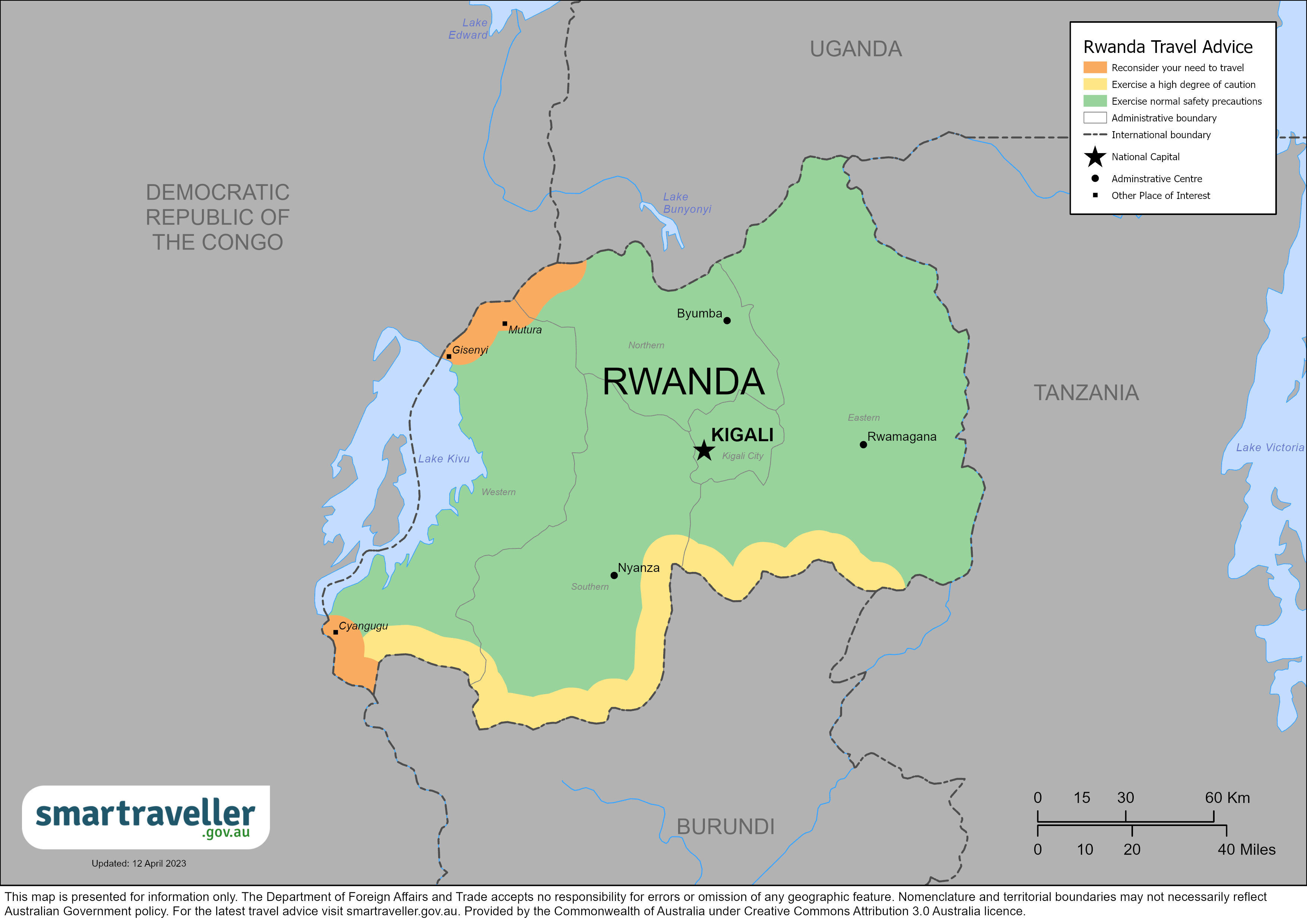
Rwanda (PDF 702.68 KB)
Africa (PDF 1.68 MB)
Local emergency contacts
Fire and rescue services, medical emergencies.
Call 112 or go to the hospital.
Call 112 or go to the local police station.
Be aware that 112 emergency calls may not be answered.
Advice levels
Exercise normal safety precaution s in Rwanda overall.
Exercise normal safety precaution s in Rwanda overall.
Reconsider your need to travel within 10 kilometres of the border with the Democratic Republic of the Congo, including the town of Gisenyi.
Reconsider your need to travel within 10 kilometres of the border with the Democratic Republic of the Congo, including the towns of Gisenyi due to:
- the unsafe security situation
- the ongoing risk of cross-border attacks by armed militias
Exercise a high degree of caution within 10 kilometres of the border with Burundi.
Exercise a high degree of caution within 10 kilometres of the border with Burundi due to:
- the unsafe security environment
- the high risk of conflict between government forces and rebels
- the risk of cross-border violence
See Safety
- The security situation within 10km of Rwanda's border with the Democratic Republic of the Congo (DRC) is volatile. Don't cross the border (see Full Advice/Travel section ).
- The land border between Rwanda and Burundi has been closed since 11 January. The border will remain closed until further notice.
- There's a risk of rebel attack in the Volcanoes National Park (Parc National des Volcans) and Nyungwe Forest. Only visit these parks as part of an organised tour group.
- Grenade attacks and other incidents have occurred in the past, including in Kigali. Targets may include genocide memorials, markets and transport hubs.
- Petty crime is quite rare, but theft from hotel rooms, homes and vehicles can occur. Keep valuables out of sight. When driving, lock your windows and doors.
- The rainy seasons are from February to May and September to December. Flooding and mudslides can make roads unusable. Be prepared to alter your travel plans.
Full travel advice: Safety
- Medical facilities are very limited. If you're ill or injured, you may need medical evacuation to Kenya. Check your travel insurance covers this.
- Malaria occurs across the country, including in Kigali. Consider taking anti-malaria medication. Other insect-borne diseases also occur. Ensure your accommodation is insect-proof. Use insect repellent.
- HIV/AIDS occurs. Take precautions if you're taking part in high-risk activities.
- Foodborne, waterborne and other infectious diseases include meningitis, meningococcal disease, tuberculosis and rabies. Drink only boiled or bottled water. Avoid raw or undercooked food.
Full travel advice: Health
- Don't use or carry illegal drugs. Penalties include long prison sentences and heavy fines.
- Same-sex relations are legal. However, LGBTI travellers may be harassed by the public and police. Avoid public displays of affection.
- Be careful when taking photos. It's illegal to photograph government buildings.
- Plastic bags are banned. Officials may fine you for having them.
Full travel advice: Local laws
- Australians can get a free 30-day tourist visa on arrival. Entry and exit conditions can change at short notice. You should contact the nearest high commission/embassy or consulate of Rwanda for the latest details.
- The land border between Rwanda and Burundi has been closed since 11 January 2024. The border will remain closed until further notice. We advise you exercise a high degree of caution within 10 kilometres of the border with Burundi.
- The security situation within 10km of Rwanda's border with the Democratic Republic of Congo (DRC) is unstable, and conflict can occur with little notice. There have been cross-border incursions in recent years, and the situation in eastern DRC has become more volatile in 2024 (see the DRC travel advice ) .
- Don't cross the border. Reconsider your need to travel within 10 kilometres of the border with the DRC, including the town of Gisenyi.
Full travel advice: Travel
Local contacts
- The Consular Services Charter details what the Australian Government can and can't do to help you overseas.
- Australia doesn't have an embassy or consulate in Rwanda.
- The Office of the Canadian High Commission to Rwanda in Kigali provides limited consular help to Australians in Rwanda. The Office doesn't issue passports.
- Full consular help is available from the Australian High Commission in Kenya .
- To stay up to date with local information, follow the High Commission’s social media accounts.
Full travel advice: Local contacts
Full advice
Civil unrest and political tension, violence and crime.
Grenade attacks and other violence have occurred in the past, including in Kigali. People have been killed and injured in these attacks.
Targets for attacks have included:
- genocide memorial sites
- taxi and bus stops
To protect yourself from attacks:
- be alert to any security threats, especially around common targets
- monitor the media and other sources for possible threats
- follow the advice of local authorities
To protect yourself against other crime, avoid walking or travelling after dark. Stay alert during daylight hours.
Demonstrations and protests
Avoid protests, rallies and demonstrations. Public protests and events that draw large groups of people can turn violent.
More information:
- Demonstrations and civil unrest
Border areas
We advise reconsider your need to travel within 10km of the border with the Democratic Republic of the Congo (DRC) as:
- the security situation can change at any time in this region
- there's an ongoing risk of cross-border attacks by armed militias from the Kivu provinces in the DRC
Don't cross the border into the DRC. We advise do not travel to the DRC. If, despite our advice, you travel to the DRC, review the travel advice for the DRC .
The land border between Rwanda and Burundi has been closed since 11 January 2024. The border will remain closed until further notice. We advise exercise a high degree of caution within 10km of the border with Burundi as:
- the security environment can change rapidly
- there's a risk of conflict between government forces and rebels in Burundi
- there's a chance of cross-border violence by armed groups, including bandits
Monitor local media and other sources for news that may affect your safety.
Volcanoes National Park and Nyungwe Forest
If you're planning to visit the Volcanoes National Park (Parc National des Volcans), book with a reputable travel agent. Only visit the park as part of an organised tour group.
You need permission from the Rwanda Office of Tourism and National Parks (ORTPN) before visiting the park or Nyungwe Forest.
The ORTPN may provide a military escort because of the risk of rebel attack.
Petty crime targeting foreigners doesn't happen often. Crimes include:
- bag snatching
- pickpocketing
Theft from hotel rooms and vehicles also occurs.
When driving, keep your valuables out of sight. Close the windows and lock the doors.
Kidnapping can happen anywhere, anytime, including in destinations that are typically at lower risk. The Australian Government's longstanding policy is that it doesn't make payments or concessions to kidnappers.
Cyber security
You may be at risk of cyber-based threats during overseas travel to any country. Digital identity theft is a growing concern. Your devices and personal data can be compromised, especially if you’re connecting to Wi-Fi, using or connecting to shared or public computers, or to Bluetooth.
Social media can also be risky in destinations where there are social or political tensions, or laws that may seem unreasonable by Australian standards. Travellers have been arrested for things they have said on social media. Don't comment on local or political events on your social media.
More information:
Cyber security when travelling overseas
Terrorism is a threat worldwide.
Climate and natural disasters
Severe weather.
Rwanda experiences natural disasters and severe weather , including:
- floods and mudslides
- earthquakes and volcanoes
If there's a natural disaster:
- always carry your passport in a waterproof bag
- keep in touch with family and friends
- check the media and other local sources for information
Flooding and mudslides
The rainy seasons are from:
- February to May
- September to December
Flooding and mudslides occur throughout Rwanda at these times.
Heavy rain may affect infrastructure and disrupt essential services. This can restrict travel if roads close.
Earthquakes and volcanoes
North-western Rwanda is in an active earthquake zone. Earthquakes and volcanoes are a threat.
Ask your host or hotel about what to do if there's an earthquake.
After an earthquake:
- expect aftershocks
- prepare for travel delays and to change your plans
- ask your travel agent and tour operators to confirm travel services and accommodation bookings
- Global Disaster Alert and Coordination System
Travel insurance
Get comprehensive travel insurance before you leave.
Your policy needs to cover all overseas medical costs, including medical evacuation. The Australian Government won't pay for these costs.
If you can't afford travel insurance, you can't afford to travel. This applies to everyone, no matter how healthy and fit you are.
If you're not insured, you may have to pay many thousands of dollars up-front for medical care.
- what activities and care your policy covers
- that your insurance covers you for the whole time you'll be away
Physical and mental health
Consider your physical and mental health before you travel, especially if you have an existing medical condition.
See your doctor or travel clinic to:
- have a basic health check-up
- ask if your travel plans may affect your health
- plan any vaccinations you need
Do this at least 8 weeks before you leave.
If you have immediate concerns for your welfare, or the welfare of someone you know, call the 24-hour Consular Emergency Centre on +61 2 6261 3305 or contact your nearest Australian Embassy, High Commission or Consulate to discuss counselling hotlines and services available in your location.
- General health advice
- Healthy holiday tips (Healthdirect Australia)
Medications
If you plan to bring medication, check if it's legal in Rwanda. Take enough legal medicine for your trip.
Carry a copy of your prescription or a letter from your doctor stating:
- what the medication is
- your required dosage
- that it's for personal use
Health risks
The Rwandan Ministry of Health has established measures for travellers arriving from areas of the DRC that are affected by Ebola virus disease.
If you are arriving in Rwanda from an Ebola affected area, you're required to undergo thermal scanner screening.
If you're transiting through DRC, the Rwandan Ministry of Health can impose a 21-day quarantine period before you travel.
More information:
- Rwandan Ministry of Health
Insect-borne diseases
Malaria occurs widely throughout the country, including in Kigali.
Other insect-borne diseases also occur, such as dengue , chikungunya , African tick-bite fever .
To protect yourself from disease:
- ensure your accommodation is mosquito-proof
- use insect repellent
- wear long, loose, light-coloured clothing
Consider taking medication to prevent malaria.
Protect yourself from HIV/AIDS infection if engaging in activities that expose you to risk.
If you're a victim of violent crime, including rape , get medical help as soon as possible.
Other health risks
Waterborne, foodborne and other infectious diseases are common. These include:
- meningitis / meningococcal disease
- tuberculosis
Serious outbreaks sometimes occur.
To protect yourself from illness:
- drink boiled water or bottled water with sealed lids
- avoid ice cubes
- avoid uncooked and undercooked food, such as salads
- avoid contact with dogs and other mammals
If you're bitten or scratched by an animal, get medical help straight away.
Don't swim in fresh water to avoid exposure to waterborne diseases, such as bilharzia (schistosomiasis) .
Get medical advice if you have a fever or diarrhoea.
- Infectious diseases
Medical care
Medical facilities.
Medical facilities are very limited throughout the country.
If you're in an accident or get sick, you may need to be evacuated by air ambulance to Nairobi, Kenya. You may need to travel further if your condition is serious. Medical evacuation can be very expensive
You're subject to all local laws and penalties, including those that may appear harsh by Australian standards. Research local laws before travelling.
If you're arrested or jailed, the Australian Government will do what it can to help you under our Consular Services Charter . But we can't get you out of trouble or out of jail.
Follow local laws in Rwanda's parks and tourism sites.
To visit parks:
- you must purchase a park permit from Rwanda’s Office of Tourism and National Parks
- you must be accompanied by an official guide. Rwanda Tour and Travel Association (RTTA) tour companies are available through Member List | RTTA
- only use established trails
Penalties for drug-related crimes are severe. They include long prison sentences and heavy fines.
- Carrying or using drugs
The public or police may harass LGBTI travellers for same-sex sexual activity, or public displays of affection.
Plastic bags are banned. Authorities may confiscate them when you arrive at the airport and in public places. They may also fine you.
It's illegal to take photos of government buildings.
A permit issued by the Rwanda Civil Aviation Authority is required to fly a drone recreationally or commercially in Rwanda.
- Advice for LGBTI travellers
- Drones (Visit Rwanda)
Australian laws
Some Australian criminal laws apply overseas. If you commit these offences, you may be prosecuted in Australia.
- Staying within the law and respecting customs
Dual citizenship
Rwanda recognises dual nationality.
- Dual nationals
Visas and border measures
Every country or territory decides who can enter or leave through its borders. For specific information about the evidence you'll need to enter a foreign destination, check with the nearest embassy, consulate or immigration department of the destination you're entering.
Tourist visa
Citizens of Commonwealth countries receive free 30-day tourist visas on arrival.
Entry and exit conditions can change at short notice. Contact the High Commission of Rwanda in Singapore or the Consulate General of the Republic of Rwanda in Australia for details about visas, currency, customs and quarantine rules.
Working or Volunteering in Rwanda
You need a valid permit to work or volunteer in Rwanda. The permit is available through the Rwanda Directorate General of Immigration and Emigration.
More information:
- Permits (Rwanda Directorate General of Immigration and Emigration)
Other formalities
Yellow fever vaccination.
You'll need a valid yellow fever vaccination certificate if you're arriving from a country with a risk of yellow fever.
- Countries with a risk of yellow fever
Some countries won't let you enter unless your passport is valid for 6 months after you plan to leave that country. This can apply even if you’re just transiting or stopping over.
Some foreign governments and airlines apply the rule inconsistently. Travellers can receive conflicting advice from different sources.
You can end up stranded if your passport is not valid for more than 6 months.
The Australian Government does not set these rules. Check your passport's expiry date before you travel. If you're not sure it'll be valid for long enough, consider getting a new passport .
Lost or stolen passport
Your passport is a valuable document. It's attractive to people who may try to use your identity to commit crimes.
Some people may try to trick you into giving them your passport. Always keep it in a safe place.
If your passport is lost or stolen, tell the Australian Government as soon as possible:
- In Australia, contact the Australian Passport Information Service .
- If you're overseas, contact the nearest Australian embassy or consulate .
Australian emergency passports are only accepted with pre-approval from the Rwandan immigration department .
Passport with 'X' gender identifier:
Although Australian passports comply with international standards for sex and gender, we can’t guarantee that a passport showing 'X' in the sex field will be accepted for entry or transit by another country. Contact the nearest embassy, high commission or consulate of your destination before you arrive at the border to confirm if authorities will accept passports with 'X' gender markers.
More information:
LGBTI travellers
Access to money
Rwanda is a cash-based society but presently electronic payments and online banking should be used wherever possible.
Only large hotels accept credit cards. Find out which credit cards your hotel accepts before you travel.
You can only cash traveller's cheques at commercial banks.
Not many ATMs accept international cards.
Most shops and businesses won't accept or change US dollars dated before 2006.
Local travel
Road travel.
You're more likely to die in a motor vehicle accident in Rwanda than in Australia.
To drive in Rwanda you'll require both your Australian driver's licence and an International Driver's Permit.
Main roads between Kigali and other major towns are generally good.
You'll likely need a 4WD to use unsealed secondary roads, particularly during the rainy season.
Avoid driving at night.
Police roadblocks are common throughout the country. They may stop you. Police may search your vehicle and luggage.
Road safety risks include:
- poorly lit roads
- poorly maintained vehicles
- speeding drivers
- roaming animals
- Driving or riding
Motorcycles
Traffic in Rwanda can be chaotic and unpredictable. Riding on motorcycles is risky for travellers. Always wear a helmet and sensible clothing. Never ride or drive while under the influence of alcohol or drugs.
If you plan to ride a motorcycle:
- check your travel insurance policy covers motorcycle rides
- use a well-known hire company with a good reputation
- always wear a helmet.
More Information
- Road safety
Use only licensed taxis with an orange-stripe.
Confirm the fare before you leave.
Avoid minivans (shared taxis) and motorbikes, especially at night. They're risky due to reckless driving, poor maintenance and petty crime.
DFAT doesn't provide information on the safety of individual commercial airlines or flight paths.
Check Rwanda's air safety profile with the Aviation Safety Network.
Rwandan airports have extensive airports security checks. You should allow sufficient time to get through security.
Emergencies
Depending on what you need, contact your:
- family and friends
- travel agent
- insurance provider
Always get a police report when you report a crime.
Your insurer should have a 24-hour emergency number.
Consular contacts
Read the Consular Services Charter for what the Australian Government can and can't do to help you overseas.
Australia doesn't have an embassy or consulate in Rwanda. The Office of the Canadian High Commission to Rwanda in Kigali provides limited consular help to Australians in Rwanda. The Office doesn't issue passports.
Canadian High Commission to Rwanda
59, KN16 Ave, Kiyovu, Kigali, Rwanda Postal Address: P.O. Box 1177, Kigali, Rwanda Telephone: (+250) 252 554 800 Fax: (+250) 252 554 810 Email: [email protected]
Opening Hours: Monday to Friday: 8am – 12pm
Full consular help is available from the Australian High Commission in Kenya.
Australian High Commission, Kenya
Limuru Road, Rosslyn Nairobi, Kenya PO Box 3008 - 00621 Phone: +254 20 4277 100 Website: https://kenya.highcommission.gov.au/ Email: [email protected] Facebook: Australian High Commission, Kenya X: @AusHCKenya
Check the High Commission website for details about opening hours and any temporary closures.
24-hour Consular Emergency Centre
In a consular emergency, if you can't contact an embassy, call the 24-hour Consular Emergency Centre on:
- +61 2 6261 3305 from overseas
- 1300 555 135 in Australia

Travelling to Rwanda?
Sign up to get the latest travel advice updates..
Be the first to know official government advice when travelling.
- International edition
- Australia edition
- Europe edition
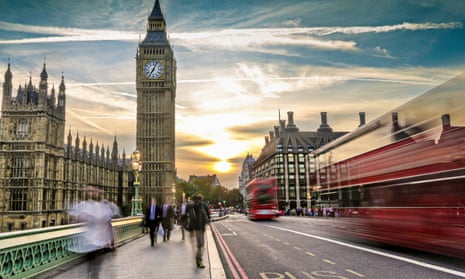
Rwanda bill further delayed after Lords again votes for changes
Legislation to go back to Commons after peers stand up for rights of Afghans and scrutiny of refugees’ treatment
The parliamentary battle over Rishi Sunak’s Rwanda deportation bill will spill into next week after the Lords refused to budge over the rights of Afghans and scrutiny of the treatment of refugees in east Africa.
The move prompted an immediate backlash from the home secretary, James Cleverly , who blamed Labour for blocking the bill and being “terrified” that the Rwanda plan would stop asylum seekers from travelling to the UK in small boats.
Following further parliamentary “ping pong” on Wednesday, the upper house backed two amendments and sent the bill back to the Commons, where it will be re-examined on Monday. The first amendment insisted on allowing parliament to decide whether Rwanda is safe, while the second exempted Afghans who helped British troops from deportation to Rwanda.
Peers voted against the flagship bill for a fourth time and sparked immediate recriminations, as Tories blamed Labour for delaying the government’s plan to “stop the boats” from becoming law.
Cleverly said: “Terrified that the Rwanda scheme will work, and desperate to delay or disrupt over a hundred votes about stopping the boats, Labour have acted again to block the passage of the Rwanda bill.
“It’s been another politically cynical effort by them, who have no alternative deterrent and no plan to tackle illegal migration, to frustrate the only solution on offer. Labour, uncomfortable with tackling immigration, will clearly stop at nothing to stop the planes.”
Peers voted by 245 to 208 in favour of Lord Hope’s amendment that would allow flights to take off only once the home secretary had the right to review Rwanda’s status as a safe country for refugees.
The Lords agreed to a measure by the crossbench peer requiring Rwanda to pass independent verification before it was considered safe.
Hope told peers that his amendment must be inserted because under the current wording, even the home secretary would not have the power to overturn the claim that Rwanda is safe.
“The minister has told you that the government are not obligated by the treaty to send anybody to Rwanda if the facts change,” he said. “That may well be so, but that is not what the bill says. The secretary of state is bound by the statute to ignore any such changes.”
A short time later, the upper chamber inflicted a further defeat, backing by 247 votes to 195 an exemption from removal for those who worked with the UK military or government overseas, such as Afghan interpreters.
The majorities by which the two amendments passed have increased since Tuesday, prompting recriminations among Conservative peers. One told the Guardian that the whipping operation had been a “joke”, while another said that the government should have made a concession.
The Labour peer Lord Coaker said it was “morally bankrupt” of the government not to prevent Afghan interpreters from being deported.
The shadow immigration minister, Stephen Kinnock, said: “Neither prime minister nor the home secretary believe this ‘batshit’ bill will end the chaos the Tories have created in our asylum system.
“They can try to blame Labour, the Lords, or even the former military leaders who voted to amend the government’s bill this evening to prevent Afghan interpreters who helped our armed forces from being sent to Rwanda. But this is their mess and they have no idea how to solve it.”
The development comes after 24 hours of parliamentary wrangling in both houses of parliament. Peers voted to amend the legislation for a third time on Tuesday, further prolonging a bicameral battle over the law intended to clear the way for asylum seekers who cross the Channel in small boats to be deported to Rwanda.
On Tuesday night, Labour and Tory whips discussed a possible compromise over the deportation of Afghan troops, the Guardian has been told. But sources said that No 10 intervened on Wednesday to quash the plan.
A Downing Street spokesperson said: “We’re not considering concessions. We believe that the bill as it stands is the right way forward.”
MPs on Wednesday afternoon stripped out all seven amendments that peers had made to the bill before the Easter recess. The Commons made one concession to the Lords and backed the government’s amendment on publishing an annual report on modern slavery.
- Immigration and asylum
- House of Lords
- Conservatives
- James Cleverly

Rwanda bill delayed for at least a day after Lords pass amendments

Number of asylum seekers left homeless after Home Office eviction soars

Sunak welcomes Kagame to No 10 as Rwanda scheme hits fresh snags

Albanians willing to be repatriated detained for weeks in UK, watchdog finds

Record 5,000 cross Channel to UK in first three months of 2024

Robert Jenrick calls for nationality data scheme to prevent UK ‘importing crime’

Home Office tried to cover up my critical reports, says sacked border chief

Home Office granted 275 care worker certificates of sponsorship after ‘false’ application
Most viewed.
We’re sorry, this site is currently experiencing technical difficulties. Please try again in a few moments. Exception: request blocked
Lords delay Rwanda bill to next week in blow to Rishi Sunak's agenda
The government was defeated twice, with peers backing the need for a report before Rwanda to be considered safe, and also preventing the deportation of those who served with or for the armed forces.

Political reporter
Thursday 18 April 2024 01:05, UK
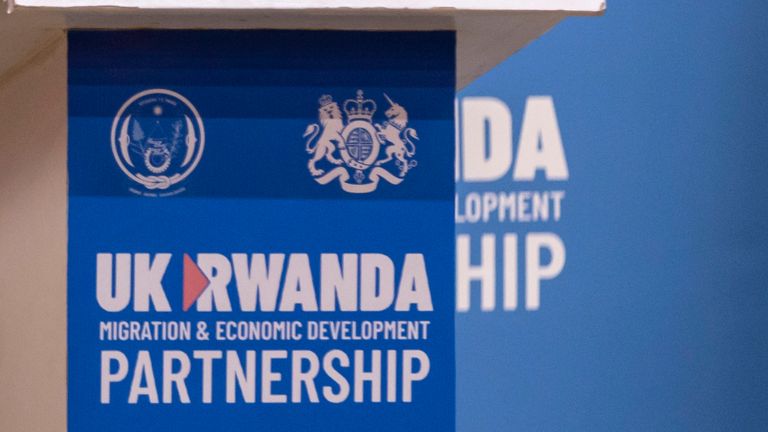
The House of Lords has delayed the passing of the government's Rwanda bill until next week - in a blow to Rishi Sunak's attempts to get planes off the ground deporting illegal migrants to the country.
MPs overturned Tuesday's attempts by the House of Lords to dilute the plan - but peers have now put forward even more changes to the proposed new law.
It is now expected that the Commons will consider the changes on Monday next week, dashing No 10's hopes to get it through today.
Downing Street has been unwilling to concede any ground on the areas that peers are trying to amend, including on the treatment of people who served with or for the British armed forces abroad.
Politics latest: Tory MP who made Rayner complaint faces awkward questions
No 10 had set its sights on passing the legislation this week as part of its plans to get planes in the air in the spring.
The Safety of Rwanda (Asylum and Immigration) Bill was tabled last year after the Supreme Court ruled the previous scheme to deport asylum seekers who arrived illegally in the UK was unlawful .
The current bill aims to declare Rwanda safe and not allow courts to consider the safety of the nation during appeals.
This is being done based on a new treaty agreed between the UK government and the government in Rwanda.
Speaking earlier on Wednesday, the prime minister's spokesperson ruled out doing a deal on any of these changes. "We are not considering concessions," they said.
"We believe the bill as it stands is the right bill and the quickest way to get flights off the ground."
Read more: Beth Rigby analysis: Plenty more showdowns to come as blame game begins
What are the latest amendments suggested by the Lords?
Of the four amendments added on Tuesday , three were tabled by Labour peers and one by a crossbencher.
The proposed changes sought to: • ensure the bill complies with domestic and international law; • that Rwanda would not be declared safe until a report was completed; • that appeals based on safety would be allowed; • and that exemptions would be allowed for people who served with or for the British armed forces.
Peers want to insist on the amendments about people who assisted the UK's armed forces, and a report advising on the safety of Rwanda, in particular.
The government was defeated on the first by 245 votes to 208 - a majority of 37, and the second by 247 votes to 195 - a majority of 52.
Labour and crossbench peers - those who do not associate with a political party - worked together to outvote the Conservatives.
A government source told Sky News: "We wanted to get it done today, but it shows Labour for their true colours."
Responding to the latest defeats, Northern Ireland minister Steve Baker told Sky News that he was "extremely disappointed" with the delays.
He denied the government had "slammed the door" on people like interpreters in Afghanistan who worked with UK armed forces.
But Mr Baker said people wanting to come to the UK who had served with British armed forces had to go through the Ministry of Defence.
"They shouldn't be travelling with people smugglers illegally across the channel - and that's what we've got to break," he said.

Keep up with all the latest news from the UK and around the world by following Sky News
👉 Listen above then tap here to follow the Sky News Daily wherever you get your podcasts 👈
Approach to military interpreters 'shameful' - Labour
The amendment on people who helped the armed forces has been at the centre of a heated debate - with the government saying it is waiting for a report on the Afghan Relocations and Assistance Policy (ARAP) before setting out its steps.
But Labour's shadow home secretary Yvette Cooper said: "Tory MPs just voted to insist that Afghan interpreters who served British armed forces can be sent to Rwanda.
"A scheme which costs £2m per asylum seeker. A £500m plus scheme for less than 1% of asylum seekers. Which now includes those who worked with our troops
"Shameful and shambolic."
Read more: Rigby: Rwanda win not automatic victory for PM Cost of Rwanda scheme could soar to £500m
Be the first to get Breaking News
Install the Sky News app for free

Johnny Mercer, a former soldier and the government's veterans minister, replied: "My team have worked night and day to find permanent accommodation for circa 25,000 Afghans who the UK have provided sanctuary to, without you lifting a finger to help.
"We want them to use safe routes, not undertake lethal channel crossings. Your concern is fake."
Related Topics
- Conservatives
- Rishi Sunak

IMAGES
COMMENTS
Call us in Washington, D.C. at 1-888-407-4747 (toll-free in the United States and Canada) or 1-202-501-4444 (from all other countries) from 8:00 a.m. to 8:00 p.m., Eastern Standard Time, Monday through Friday (except U.S. federal holidays). See the State Department's travel website for the Worldwide Caution and Travel Advisories.
March 29, 2024. Rwanda - Level 1: Exercise Normal Precautions. O. Reissued with updates to add area of Level 3. Exercise normal precautions in Rwanda. Some areas have increased risk. Read the entire Travel Advisory. Exercise Increased Caution in: The Rwanda-Burundi border due to armed violence.
Before planning any international travel, please review the CDC's specific recommendation for vaccinated and unvaccinated travelers. Visit the Embassy's COVID-19 page for more information on COVID-19 related restrictions and conditions in Rwanda. The U.S. Embassy cannot release you from Government of Rwanda-required quarantine.
Find information about all government services including legal and travel documents, business, career opportunities and more. Irembo | Irembo | ... Kigali, 11 January 2024 - The Government of Rwanda has learned through media reports of the unilateral decision by the Government of Burundi to…
As part of the Government measures to prevent diseases that can potentially become epidemics, the Ministry of Health informs the general public and the international travelers visiting Rwanda of the following: ... The following Covid-19 travel guidelines and procedures are in place for travelers, effective immediately. ...
Before traveling to Rwanda and during your stay here, we recommend that you review useful information from the Department of State, including Travel Warnings; the Worldwide Caution announcement; and U.S. Embassy Kigali's most recent Messages for American Citizens . U.S. citizens are strongly encouraged to maintain a high level of vigilance ...
All travelers arriving in Rwanda must be tested negative for COVID-19 within 72 hours of departure, complete the passenger locator form, and upload the COVID-19 test certificate. Read more Covid-19 travel guidelines here ; Land borders will remain closed, except for goods and cargo, as well as returning Rwandan citizens and legal residents.
Visit the U.S. Embassy Rwanda webpage on COVID-19 for information on conditions in Rwanda. Assistance: U.S. Embassy Kigali, Rwanda 30 KG 7 Avenue (Kacyiru) +250 252 596 400; [email protected]; https://rw.usembassy.gov; State Department - Bureau of Consular AffairsRwanda Country Specific Information +1 888 407 4747 +1 202 501 4444
Protecting yourself and your belongings. Crime levels are relatively low in Rwanda, but there are cases of burglary, theft, bag-snatching and mugging (violent theft) in Kigali. To reduce your ...
EATV application - Government of Rwanda. Border closures. The border between Rwanda and Burundi has been closed since January 11, 2024. The border will remain closed until further notice. Children and travel. Learn more about travelling with children. Yellow fever. Learn about potential entry requirements related to yellow fever (vaccines ...
To enter Rwanda, your passport must have an 'expiry date' at least 6 months after the date you arrive and at least one blank page for entry stamps. Check with your travel provider that your ...
Tourism. Known as the land of a thousand hills, Rwanda's stunning scenery and warm, friendly people offer unique experiences in one of the most remarkable countries in the world. It is blessed with extraordinary biodiversity, with incredible wildlife living throughout its volcanoes, montane rainforest and sweeping plains.
Since August, 2021 the United States has donated 10,375,320 safe and effective COVID-19 vaccine doses with the people of Rwanda. This includes 10,039,320 Pfizer and 336,000 J&J doses. Of the 10,375,320 vaccine doses, 100% were donated in partnership with COVAX. The United States is committed to leading an international and coordinated effort to ...
Discover the top Rwanda tourist attractions and more in our Rwanda travel guide. Int Toll Free Numbers 1-866-438-8677. 1-888-360-2392; 1-800-619-441; 0800-404-9451 +27-21-481-4900. Travel Deals. ... It has more women in government than any other country in the world, and is one of the cleanest, friendliest and safest places you can visit in ...
Rwanda Travel Advisory: Level 1: Exercise Normal Precautions: March 29, 2024: Sao Tome and Principe Travel Advisory: Level 1: Exercise Normal Precautions: ... entities on this page are provided as a convenience and should not be construed as the U.S. Department of State or U.S. government endorsement of the entity, its views, the products or ...
TRAVEL DOCUMENT. * Any genuine acceptable travel document valid not less than 6 months. VISA FEES. * 50 USD for single entry and free of charge for nationals of countries with which Rwanda has a visa waiver arrangement including African Union, Common Wealth and La francophonie. * 70 USD for multiple entries.
This blog post of Rwanda travel tips shares what we didn't know before we came and learned along the way. Since we only visited for eight nights, we're far from Rwanda travel experts. ... That's because in 2006 the Rwandan government got rid of its old provincial lines, redrew four new ones (North, South, East, and West), and renamed many of ...
FCDO travel advice for Rwanda. Includes safety and security, insurance, entry requirements and legal differences. ... Government activity Departments. Departments, agencies and public bodies. News ...
The Emergency Travel Document (ETD) is only valid for five (05) days from the date of issue including weekends and public holidays. Hence, all applicants are STRONGLY advised to apply for an Emergency Travel Certificate at least two (2) days prior to travel date. The Emergency Travel Document must be surrendered upon arrival to the Immigration Officer at the point of entry in Rwanda
General Travel Advice. Irish citizens require a visa to enter Rwanda. A valid passport is required for travel to Rwanda Irish passports should have a minimum validity of 6 months. Passport cards cannot be used. For more information on visas and passports, please see the Additional Information tab. Visitors to Rwanda are advised to follow the ...
April 17, 2024, 6:16 a.m. ET. Britain's Conservative government hopes to pass the Safety of Rwanda Bill on Wednesday, after a prolonged back and forth through the two houses of Parliament in ...
The Centers for Disease Control and Prevention (CDC) has issued a Level 2 Travel Health Notice for Rwanda due to COVID-19, indicating a moderate level of COVID-19. Your risk of contracting COVID-19 and developing severe symptoms may be lower if you are fully vaccinated with an FDA authorized vaccine . Before planning any international travel ...
The land border between Rwanda and Burundi has been closed since 11 January 2024. The border will remain closed until further notice. We advise you exercise a high degree of caution within 10 kilometres of the border with Burundi. The security situation within 10km of Rwanda's border with the Democratic Republic of Congo (DRC) is unstable, and ...
Peers voted against the flagship bill for a fourth time and sparked immediate recriminations, as Tories blamed Labour for delaying the government's plan to "stop the boats" from becoming law.
The Government of Rwanda has announced a suspension of all arriving and departing air travel starting at midnight on Friday, March 20, 2020, for an initial period of 30 days. The U.S. Embassy in Rwanda will provide more information as it becomes available from the Government of Rwanda.
The UK-Rwanda partnership. Pic: AP. The House of Lords has delayed the passing of the government's Rwanda bill until next week - in a blow to Rishi Sunak's attempts to get planes off the ground ...